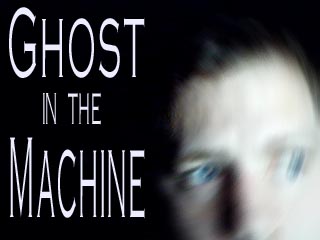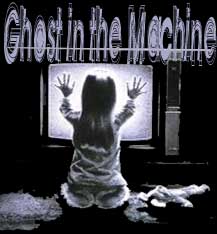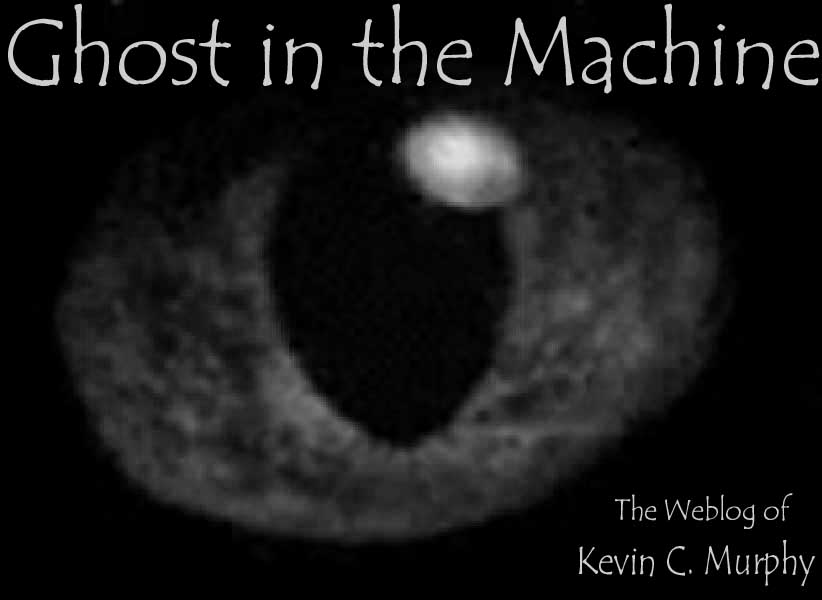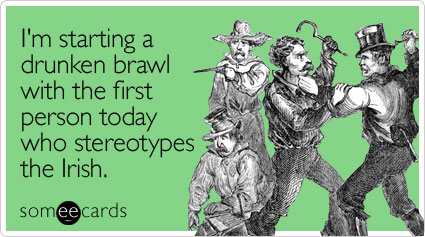
A very happy St. Patrick’s Day to you and yours.
Haunting the Web Since 1999
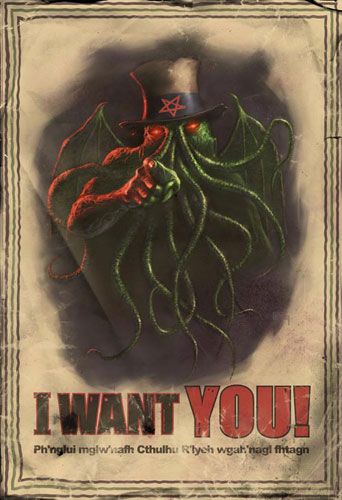
A very happy Valentines Day to you and yours. To keep tradition going for its sixth year here at GitM — ’05, ’06, ’07, ’08, ’09 — time for the yearly musical valentines from yours truly.
First off, in keeping with the usual once-a-year romantic status-update, you’ll be happy to know that this 2010 post actually comes with 44% less whining than usual. (Yay, and there was much rejoicing.) I am still single on this end, as per the norm, which means my trusty sheltie sidekick is once again holding down the official valentine spot. (Aw, he got me Bioshock 2. How did he know I wanted it?) But, having at last escaped the egregious emotional, financial, and general personal sandtrap that is late-term gradual school, it’s safe to say I’m in a much happier place these days. And, since returning to DC, a town that’s been swell to me so far, I’ve at least been taking a few swings at the plate lately. So, no wallowing this V-day. I’m in a pretty good place, all in all, and hope springs eternal. In any event, on to the music:
What role do you want to play?
I’m just a click away, night or day.
And if you think I’m not the one,
Log off, log off and we’ll be done…”
But can she kite the adds? First off, as always, I offer some quality cheese: Singlehandedly raising unrealistic expectations for gamergrrls the world (of Warcraft) over, The Guild‘s fetching Felicia Day scored a massive (multiplayer) online hit last summer with the supremely catchy “Do You Wanna Date (My Avatar)?” In some ways a peppy, poppy update to Kraftwerk’s “Computer Love” (which led off the order in ’06) this was one of two songs I heard in the past year that I knew — immediately — would make it into this post.
Now, having spent more than my fair share of time MMO’ing over the past few years — everybody say hi to Jacklowry — it’s safe to say that the bubbly, infectious enthusiasm that drives this track isn’t really a huge part of games like Warcraft. (In fact, everyone usually seems vaguely depressed — There’s a reason why some of the biggest facets of WoW-life are “grinding” levels and “farming” mats. If you take it seriously, it sorta becomes a day job.) But, all that being said, Day and The Guild crew know their WoW — how ’bout a little tank-and-spank? — and they’ve delivered a ditty that works as both a fun and knowing riff on the MMO life and a silky, effervescent pop song all on its own. Great job, y’all…Lvl 80 rogue lf healbot pst?
Girl I refuse, you must have me confused
With some other guy
Your bridges were burned, and now it’s your turn
To cry, cry me a river.”
Don’t it make you sad about it? This song probably needs no introduction — most everybody knows it, and I’m sure a lot of people are totally sick of the durned thing. Still, since the last song, however cheesy, is already a gamer standard and perhaps not nearly as embarrassing a guilty pleasure as I’ve tended to offer in years past, I give you JT’s “Cry Me a River.”
It’s easy to playa-hate Justin Timberlake, and to be honest, I think I can only name three or four songs of his anyway. Still, I’d argue this well-crafted track and “SexyBack” put JT as the truly deserving 21st century pop heir to, say, Stevie Wonder or Michael Jackson. He’s got the pipes, he’s got the beats, he’s got the production values, the dance moves, and the marketing savvy, and to my mind “Cry Me a River” just holds it own as a classically catchy pop ditty. And when the scorned lasses of this world roll out Gloria Gaynor’s “I Will Survive” as their peppy post-break-up standard on the dance floor, I in turn will call forth this track, Pokemon-style. Game on.
Your eyes are soft with sorrow,
And I know when to say goodbye.
While I threw up some Dylan in both ’06 and ’07, I try not to repeat artists just yet for these V-Day posts. Still, while the sublime “I’m Your Man” — which quite possibly can’t be topped as a V-Day song — was part of the 2007 mix, I’m going with Leonard Cohen’s “That’s No Way to Say Goodbye” this year from Live in London. Not only because it is beautiful, but because, frankly, I played the hell out of this record over the past year.
When he’s at his best, as he is throughout Live in London, Cohen’ sheer rawness — his naked, direct emotion — cuts like a knife. He’s not one to dabble in misdirection, or to try to obscure his feelings with extended metaphors. He just goes right to the heart of it, every time.
With that in mind, I much prefer this version of “That’s No Way to Say Goodbye” to the original 1967 version. At times, the young Cohen sounds too callow to me. It took years, even decades, for his voice to catch up to the power of his poetry. And the slight change in lyrics here — Now it’s “I know when to say goodbye” — helps push this ballad from petulance to poignance. It’s one of many transcendant moments on this superlative album.
And, really, who doesn’t love sleep? As a love-song sorbet of sorts, here’s The Dandy Warhols’ “Sleep.” Like Brian Eno’s “By this River” and Hot Chip’s “Crap Kraft Dinner” (written up in ’09), this is one of those songs I find endlessly soothing. It could just play on and on like this for twenty minutes and I’d be blissfully content…perhaps eventually nodding off, fading away into the wilderness of dream…
Go on, give me a reason to love you
Give me a reason to wanna be your man
Give me a reason to love you
Give me a reason if you can.”
As I said back when hyping Third in 2008, Portishead’s Dummy was one of those ubiquitous albums for a few years there in the mid-nineties, with the most memorable track therein possibly being “the second single, “Glory Box.” I include the late guitarist John Martyn’s cover of “Glory Box” here not because it’s an improvement on the original — they’re both amazing — but because it captures so well that song’s hothouse sultriness, while managing to sound quite different in the end (and switching the gender dynamic.)
Also of note on this subject: Portishead’s “Scorn,” the ice-cold B-side version of this same song. I love how it completely inverts the sensation of the original tune, just by switching the beats involved. Now, the whole song plays out atop that sensual, brooding oil-tanker rhythm only heard when everything goes wobbly in the original version. And, conversely, only in the climax of this mix are the original lyrical strings heard, like a moment of clear-thinking grace before the hammers descend anew. (The Youtube of “Scorn” below cuts out the end, unfortunately, although you can hear the whole mix here.)
Juliet says, ‘Hey, it’s Romeo, you nearly gave me a heart attack!’
He’s underneath the window, she’s singing, ‘Hey la, my boyfriend’s back.’
You shouldn’t come around here singing up to people like that…
Anyway, what you gonna do about it?”
You and me, babe, how ’bout it? Now, if forced, with a gun to my head, to pick the Dire Straits’ absolute finest hour, I’d have to go with “Sultans of Swing”, that testament to resolute keep-on-keepin’-on long after the crowd’s gone home and all the midnight oil is burned. Still, their brief retelling of “Romeo & Juliet” is an unabashedly lovely song indeed. (Full disclosure: This was, in fact, the favorite tune of one of my former ex’s, a long, long time ago. But, no plagiarism here. I ended up earning this streetlight serenade’s stripes myself…the hard way. Anyway, let’s move on.)
There are a lot of covers of “Romeo & Juliet” floating around — Indigo Girls, The Killers, Edwin McCain — but none of ’em really do the simple beauty of this song justice. Also, the original Dire Straits video is also online, but frankly it’s so bad and ridiculously Eighties-ish that it detracts from the timelessness of the tune. No wonder they later plunked down big dollars for “Money for Nothing“…
All i needed was the love you gave
All i needed for another day,
And all i ever knew,
Only you.”
As I’ve said ’round here many times, I’m a big Depeche Mode fan from way back. (Their “Here is the House” went up here in ’06.) And I think they became a better, darker, richer band in 1982 with Vince Clarke’s departure after Speak & Spell, when Martin Gore took over the songwriting full-time.
Still, with all due respect to melancholy Marty, Vince Clarke always had a way with a happy three-chord love song that the minor-key-obsessed DM never ever really got back to. Case in point: Yaz’s “Only You” (as well as almost all of Erasure’s many hits over the years.) There are no regrets or guilt or religious allusions or teenage scared-stiff-of-sex angst or black cars driving around in the distance. It’s just a simple, very pretty ode to that one special person.
There are a lot of very good tracks on the better of Yaz’s two albums, Upstairs at Eric — “Don’t Go,” “Situation,” and “Winter Kills,” for example. Still, I’d put “Only You” as the pick of the litter: It’s the perfect blend of Vince Clarke synth-pop and Alison Moyet soul.
How can we ever know
We’ve found the right person in this world?
(he means he looks at other girls)
Love is a mystery, It does not follow the rules!
(this guy is a fool)
(he’ll always be a boy, he’s a man who never grew up)
I thought I told you to shut up…”
The first time you get dumped, it feels like a tragedy. It just plain sucks. The second time, it…well, actually it’s even worse. And by the third or fourth time, you start to really wonder what’s wrong with you. But, after enough iterations of the dismal cycle, as the Conchords’ “Carol Brown” points out, it does become farce. And a really funny one, for that matter.
Along with Felicia Day at the top, this is the other song I knew I was going to post here this year as soon as I heard it. The Flight of the Conchords’ second season included a lot of really hilarious tunes: “Hurt Feelings” (and its reprise), “Too Many Dicks on the Dance Floor,” “Fashion is Danger.” But “Carol Brown” is, imho, their magnum opus. It’s funny on its own terms (as well as a great riposte to Paul Simon’s smarmy “50 Ways to Leave Your Lover.”) But, more importantly, it’s just a funky-sweet song with truthiness to spare. (The Michel Gondry video is great too.)
I’m sure most of y’all out there know the old Annie Hall joke: “This guy goes to a psychiatrist and says, ‘Doc, uh, my brother’s crazy; he thinks he’s a chicken.’ And, uh, the doctor says, ‘Well, why don’t you turn him in?’ The guy says, ‘I would, but I need the eggs.’ Well, I guess that’s pretty much now how I feel about relationships; y’know, they’re totally irrational, and crazy, and absurd, and…but, uh, I guess we keep goin’ through it because, uh, most of us…need the eggs.“
That’s the gag that “Carol Brown” gets so well. The whole song is a litany of ugly dumpings for most of its run. But every time that peal chimes (at 1:15) and the angelic chorus kicks in for the first time (“He doesn’t cook or clean…“), you can hear exactly why Jemaine — and so many others of us, for that matter — keep leading chin first regardless. Carol Brown took a bus out of town…but I’m hoping the next gal sticks around.
That’ll do for ’10, I think. Have a safe and happy Valentines Day, everybody. I’ll see y’all on the flip side. And, until next year…
As you can see from the pics above and below, at least Berk‘s been having great fun with it, although he may feel differently if I take him to the 2pm Dupont shootout.
Sorry about the radio silence over the past week. I’ve been ensconced away at the yearly office retreat, which coupled with family in town and a very busy work week regardless, cut deeply into the GitM time. There’s been quite a lot of big doings over the past week, and I’m four movie reviews behind at the moment, but hopefully I’ll catch up over the next several days.
If you’re here on GitM’s front-page, I presume you’re already up on recent posts. But, just as an FYI: While doing some overdue site clean-up this morning (including updating GitM’s neglected sub-site spawn, Small-R Republic and GitM Reviews), I re-posted the recent 5-part Top 100 Films of the Oughts list all in one place — here (or, alternatively, http://bit.ly/100films.) So, if you haven’t perused it yet, enjoy.
Hello again, and a happy New Year’s Eve to you and yours. Well, I thought this Best of the Decade would end up being four parts, but now it’s looking like five. The recaps for this last twenty-five got so long that MT seems to be consuming the bottom of the entry as I write.
So, with that in mind, here’s #’s 25-11 for the Oughts, with the top ten of the decade to follow in due course. If you’re new to this overview, be sure to check out part 1, part 2, and part 3 before moving on to the…

| From the original review: “All in all, this is a marvelously genre-bending film with wonderful anchoring performances by the Gyllenhaals. I think I liked this movie much more for not knowing a lot about it going in, so I won’t mention the particulars here. But it’s definitely worth seeing. Extra points for the soundtrack, which with ‘Head over Heels,’ ‘Love will Tear Us Apart,’ and ‘Under the Milky Way’…reminded me more of my own high school experience than any other film I can remember. (The Dukakis era setting helped, since that was my own eighth grade year.)“ |
I almost took this movie out of the top 25 on account of its association with Southland Tales and The Box, and even the director’s cut of this film, which snuffs out a lot of this movie’s weird magic by slathering it in needless Midichlorian-style exposition. As I said in my recent review of The Box, Donnie Darko seems to be a clear and undeniable case where studio intervention saved a movie.
Nevertheless, part Philip K. Dick, part John Hughes, Darko was a touching coming-of-age story (thanks in good part to Mary McDonnell and Holmes Osborne as Donnie’s cranky but loving parents), a decently funny satire about the vagaries of small-town life (think Sparkle Motion, “sleep-golfing,” and the Love-Fear axis), and a trippy sci-fi/psychological thriller. (Was Donnie really talking to a demon-rabbit from the future, or was he just off his meds? The original version muddles this question a lot better than the Kelly cut.)
Whether or not Richard Kelly just got struck by lightning here, everyone else involved clearly brought their A-game to this production. Two Gyllenhaals got on the Hollywood board with this flick, although Maggie would have to wait for Secretary to really break out. The Michael Andrews score contributed mightily to the proceedings, as did the Gary Jules cover of “Mad World,” which got a lot of run in the Oughts, from Gears of War to American Idol. And there are plenty of quality performances in the margins, from the late Patrick Swayze riffing on his image, to Beth Grant typecasting herself for the decade, to Katharine Ross coming back for one more curtain call. Fluke or not, the original version of Donnie Darko was one strange and memorable bunny, alright.
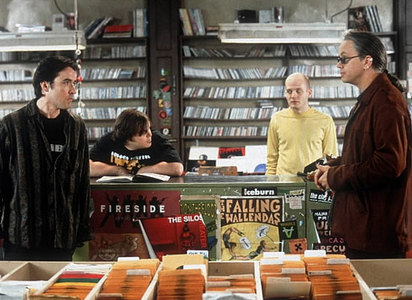
| From the year-end list: “An excellent adaptation of a great book, even if I preferred the Elvis Costello britrock emphasis of Hornby’s tome to the indie Subpop scene of the movie.“ |
“Charlie, you f**king b**ch! Let’s work it out!” Arguably John Cusack’s finest hour (although 1999’s Being John Malkovich is right up there, and I know many might cite the Lloyd Dobler of old), Stephen Frears’ adaptation of Nick Hornby’s High Fidelity has continued to grow on me over the years. If it counts as one of David Denby’s slacker-striver romances (see the discussion of Knocked Up at #40), it’s definitely the one that hits closest to home for me.
The first thing people usually remember about this movie is all the Jack Black/Todd Louiso banter in the record store. (“It’s a Cosssssby sweater!“) And it’s true — All of that stuff is both really funny and all too telling about the elitism and obsessiveness inherent to the fanboy mentality — “Don’t tell anyone you don’t own ‘Blonde on Blonde’! It’s gonna be okay.” Besides, let’s face it, this entire end-of-the-decade list is really just an extended High Fidelity-style Top 5 (and I had a great time back in July organizing my history books chronologically, a la Rob’s record collection.)
Still, as with the book, High Fidelity‘s killer app is really the dispatches filed from Rob’s romantic life, as he ponders what went wrong with his Top 5 Crushes gone awry. (“We were frightened of being left alone for the rest of our lives. Only people of a certain disposition are frightened of being alone for the rest of their lives at the age of 26, and we were of that disposition.“) There’s a lot of truthiness throughout High Fidelity, from Rob’s catastrophic hang-up on Charlie (Catherine Zeta Jones) to his eff-the-world rebound with an equally besotted Sarah (Lili Taylor), to his single-minded infatuation about whether his ex, Laura (Iben Hjejle), has slept with the loathsome new boyfriend, Ian (fellow Tapehead Tim Robbins in a great cameo) yet.
In short, I’d argue High Fidelity gets the inner-male monologue closer to right than any flick this side of Annie Hall. In the immortal words of Homer J. Simpson, it’s funny because it’s true.

| From the original review: “By the end of this extended tale of romance and loss, I had half a mind to just curl up in a ball and drift amid a sea of despond for the rest of the night, lost in the phantom reverie that was both the allure and prison of “2046” in 2046. Even stronger was the urge to light a cigarette and watch the tendrils of smoke slowly writhe and curl through a shaft of light, preferably to the strands of some vintage Nat King Cole. If nothing else, these very worthwhile films suggest, if you’re going to ruminate on old heartaches, you might as well look really good doing it.” |
Some might consider this cheating to include Wong Kar-Wai’s In the Mood for Love and 2046 in the same spot. But I watched them back-to-back in the same evening, and so they’re inextricably tied together to me, even more than they would be anyway.
No word better describes these two films than sensual. The ruffle of silk, the click-clack of Mahjongg tiles, the strains of Nat King Cole, the ice cubes popping in the glass, the tendrils of smoke wafting through a shaft of light, the bead of sweat slowly gliding down the neck of Maggie Cheung. Wisps of melancholy, twinges of regret, and an irrepressible longing. Those are the grace notes Wong Kar-Wai uses to compose this evocative, moving duet about a love story that barely ever happened, and the lingering effect it has (throughout 2046) on Tony Leung. Unlike the almost-clinical restraint of, say, Ang Lee (see, for example, Lust, Caution) Wong Kar-Wai’s films burst at the seams with emotion, and these two are no exception. Unforgettable, that’s what they are.
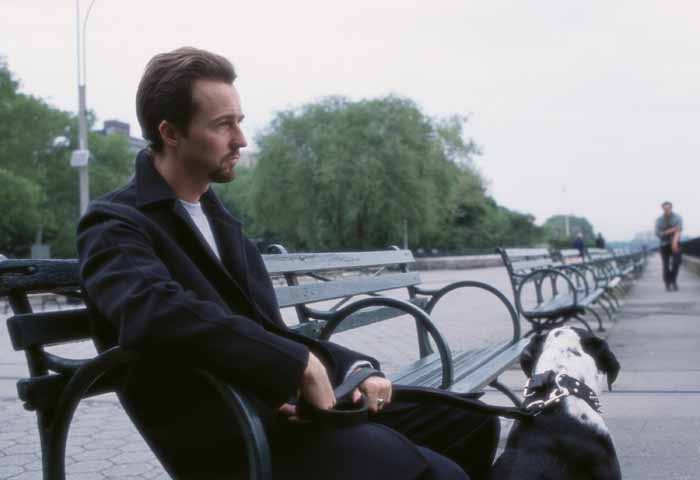
| From the original review: “[I]t perfectly captured the feeling of life in New York after the fall. Everyone’s trying to go on with their business and pretend to move on, and yet everywhere you look there are grim reminders of that day’s events, and somehow it’s all you end up talking about. And the last fifteen minutes of the film, which tread a very fine line between hokey and surprisingly touching, are a haunting representation of what was lost that day (and, Lee seems to suggest, what could be lost if further attacks necessitate a New York diaspora.) In effect, this is Lee’s ode to NYC’s magic and resilience, and I think there were very few other filmmakers that could have pulled this off.”
From the year-end list: “Another 2002 hold-over, and the best film yet made about the aftermath of 9/11, (which only seems natural, given that it’s by one of New York’s finest directors.) Haunted by might-have-beens, what-ifs, and what-nows, The 25th Hour feels real and immediate in its attempt to grapple with both 9/11 and the slamming cage in Monty Brogan’s future. Only once, with the Fight Club-like fracas in the park, does the film flounder. Otherwise, it’s a thought-provoking meditation throughout.“ |
What I said back in 2003 holds true now: In a decade that became irrevocably warped by the events of 9/11, Spike Lee’s The 25th Hour is still the best movie yet made about the emotional aftermath of that dark day. And just as Inside Man covered a lot of the same ground on race as the woefully overrated Crash, all the while managing to tell a zippy heist tale, The 25th Hour does almost all of this 9/11 heavy lifting as subtext to the story at hand.
For Edward Norton’s Monty Brogan, who’s facing down a prison sentence, as with everyone else, there is a hole in the center of the world. Things have changed, and the question now is what to do about it. Some grasp desperately for new meaning and connection in others, like Philip Seymour Hoffman’s schlubby teacher, eyeing his student (Anna Paquin) in a nightclub. Some refuse to acknowledge the new reality at all, and just get louder and more obstinate about the way things are, like Barry Pepper’s Wall Street trader. And some, like Monty, take the time to reflect on what’s brought this lowly state of affairs.
The memorable scene where Monty rages at the bathroom mirror about New Yorkers and city life is classic Spike. It’s funny, it knows its NYC, and it brings to mind all the mistrusts that led to tragedy one sweltering Brooklyn day in 1989’s Do the Right Thing. But the coda of The 25th Hour, arguably the most lyrical sequence Lee has ever assembled, goes even deeper. It waxes on the underlying bond of New York, what it really means to be from NYC. “You’re a New Yorker, that won’t ever change. You got New York in your bones. Spend the rest of your life out west but you’re still a New Yorker. You’ll miss your friends, you’ll miss your dog, but you’re strong.” And it explains exactly what was lost that Tuesday morning at Ground Zero, the Pentagon, and the fields of Pennsylvania — the chance for 2752 men, women, and children to experience a long and happy life.
I’ll let Brian Cox take it from here: “You have a son, maybe you name him James, it’s a good strong name, and maybe one day years from now years after im dead and gone reunited with your dear ma, you gather your whole family around and tell them the truth, who you are, where you come from, you tell them the whole story. Then you ask them if they know how lucky there are to be there. It all came so close to never happening. This life came so close to never happening.”
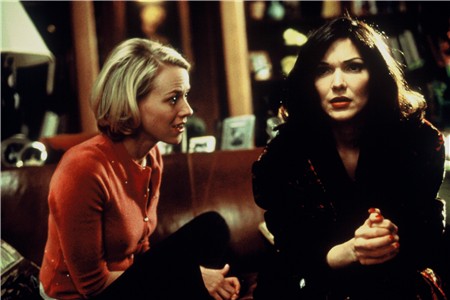
| From the year-end list: “Just when you thought it was safe to see a David Lynch film. After the surprisingly conventional Straight Story, Mulholland proves that David Lynch is still a master craftsman of the mindbender.“ |
I still haven’t seen Inland Empire, David Lynch’s only other full-length film of the decade. (And at three hours, it’s definitely “full-length.” Offhand, according to a friend of mine, the IFC Center in the Village apparently had a “see-it-nine-times, get-the-tenth-time-free” special going on during its run.) Nonetheless, the eerie and unsettling Mulholland Drive is Lynch in top form, and a definite improvement on his last mindbender, 1997’s so-so Lost Highway.
Lynch tends to repeat himself quite a bit, true. Dean Stockwell sung about the Sandman in Blue Velvet, and here we have Roy Orbison being crooned in Spanish. And, as always, there’s a bizarre conspiracy afoot — this time, involving a cowboy. Still, when Lynch is on, nobody is as good at making you feel like you’re trapped in a nightmare, maybe even someone else’s nightmare, and just can’t wake up. (With that in mind, certain elements of 1992’s Twin Peaks: Fire Walk With Me still make me shiver just thinking about them — the moving picture on Laura’s wall, for example, or the Ray Wise trapped-monkey thing. Garmenbozia…)
Obviously, there’s a lot of that sort of stuff here too — the whatever-it-is behind the diner, the blue box, the corpse with a hole for a face. Dune and The Straight Story notwithstanding, Lynch’s movies tend to move to dream logic, and Mulholland Drive was no exception. This one is about the Hollywood dream. Like Naomi Watts’ character, most folks move out there with reveries of being a star, (“I just came here from Deep River, Ontario, and now I’m in this dream place!“) And, like Naomi Watt’s character, a lot of them see that dream die hard. albeit perhaps not as hard as she does. (One small irony here: Thanks to Mulholland Drive, Naomi Watts is now an A-lister.)
Who knows how Mulholland Drive would’ve ended up if it had been optioned as the television show it was meant to be? But as a movie, it turned out to be pretty darned disconcerting, and one of the best films of the decade.

| From the original review: “[A]n impressive and heartfelt depiction of how one man’s personal Hell becomes, through love, will, memory, and imagination, at least a barely endurable purgatory…And, when the camera later forsakes the diving bell world of flesh and frailty for the butterfly realm of memory and imagination, we feel the same exhilarating sense of liberation Bauby describes in voiceover. By finally soaring out of the confines of Bauby’s body and roaming the world with abandon, Diving Bell offers a visceral reminder of the power of film, and of imagination.”
From the year-end list: “Through the wonders of cinematic alchemy, Julian Schnabel took the sad real-life account of Vogue editor Jean-Do Bauby’s horrific imprisonment within his own body and made it soar. No other film this year put the “locked-in” experience of taking in a movie as inventively in service of its story…Special kudos to Mathieu Almaric for conveying so much with so little to work with, and to Max von Sydow for his haunting turn as Bauby’s invalid father.“ |
Aside from being a moving story about adversity overcome, Julian Schnabel’s The Diving Bell and the Butterfly has one really great conceit that makes the whole film work wonders: A moviegoer is as locked-in to whatever’s on the screen as poor Jean-Do Bauby was in his paralyzed form. This conceit — making “the male gaze” literal — forms the basis of much of the Diving Bell experience, and it’s what really makes the movie tick.
The first twenty minutes or so of the movie are completely claustrophobic, mainly because you’re locked-in there right next to Mathieu Almaric. And when Bauby finally begins to use his imagination to drift outside himself, and the camera at long last begins to move, the effect is as liberating and refreshing to us as a breath of cold mountain air. We viscerally feel the sense of reprieve that Jean-Do Bauby wrote about in his posthumous memoir, blink by pain-staking blink. It’s no mean trick, and it gives The Diving Bell and the Butterfly a real emotional wallop that’s hard to shake off and harder to forget.
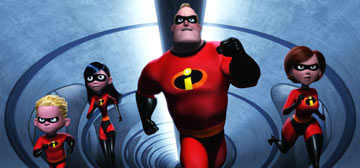
| From the original review: “Well, the folks making next summer’s Fantastic Four film must be having a really bad couple of weeks. ‘Cause it’s hard to see how they can even close to topping the energy and fun of Brad Bird’s The Incredibles, Pixar’s new gold standard (and here I thought Toy Story 2 was going to hold that honor for some time to come.) More a film for comic fans than for little kids, The Incredibles is an inventive, madcap romp through superhero tropes that gives Spiderman 2 a serious run for its money as the best comic book film of 2004.”
From the year-end list: “Pixar has been delivering well-constructed eye-popping wonders since Toy Story, and The Incredibles is the best of the lot. I figured it might be awhile before a movie topped Spiderman 2 as a sheer comic book spectacle, but, as it turned out, The Incredibles did it only a few months later. One of the best comic book films ever made, The Incredibles was two hours of unmitigated fanboy fun.“ |
To be honest, and as with Ratatouille (another Brad Bird-helmed Pixar production), I’m still a bit concerned about the political economy of The Incredibles. I’m all for an aristocracy of excellence, but it’s hard to shake the contempt-for-the-rabble undertones and vaguely Ayn Randish sensibility that both Brad Bird movies possess, what with their “actually, some children (or rat chefs) are more special than others” through-lines. (And while I’m on the subject, I don’t really cotton much to Craig T. Nelson’s worldview either.)
But, now that I’ve gotten that out of the way, The Incredibles was as fun and imaginative a comic-book movie as we saw in the Oughts. True, like the television show Heroes, The Incredibles borrowed substantially from Alan Moore’s Watchmen before Zack Snyder ever got around to it. But, as I said back in 2004: More than anything else, The Incredibles — apologies to Tim Story, both times — was probably the closest thing we’ll ever get to a really good Fantastic Four movie, right down to the Mole Man-like Underminer that closed the film.

| From the year-end list: “In a spring and summer characterized by truly awful blockbusters, this small film proved that a great story is still the best eye-catcher around. A gimmick, perhaps, but flawlessly executed.“ |
“Now…where was I?” With Guy Pearce reprising Tom Hanks’ earlier role as Mr. Short-Term Memory, Christopher Nolan kicked off a strong decade with Memento his sleek, well-scripted psychological thriller about an amnesiac in pursuit of justice (re: vengeance) for his murdered wife. As with Diving Bell and the Butterfly, this movie relies heavily on one neat trick that most everyone knows by now — the story is told backwards. But, even that gimmick notwithstanding, Memento still holds up. (In fact, I watched it again this summer, and was surprised by how engaging it remained.)
To put on the political cap for a second, you could argue the questions Memento poses resonated throughout the Oughts. Like other folks we might mention, Guy Pearce’s character here bends the facts of a horrible crime to slake a thirst for revenge. He pins the blame on crooks who had nothing to do with his original motivation. He wallows in an aggrieved, even mostly-contrived sense of injustice to propel himself forward to darker deeds. And he just keeps forgetting what really happened, because, as George Costanza once instructed us, “It’s not a lie if you believe it.” Sound like anyone from the past decade? Hmmm…I’ll have to think on it.
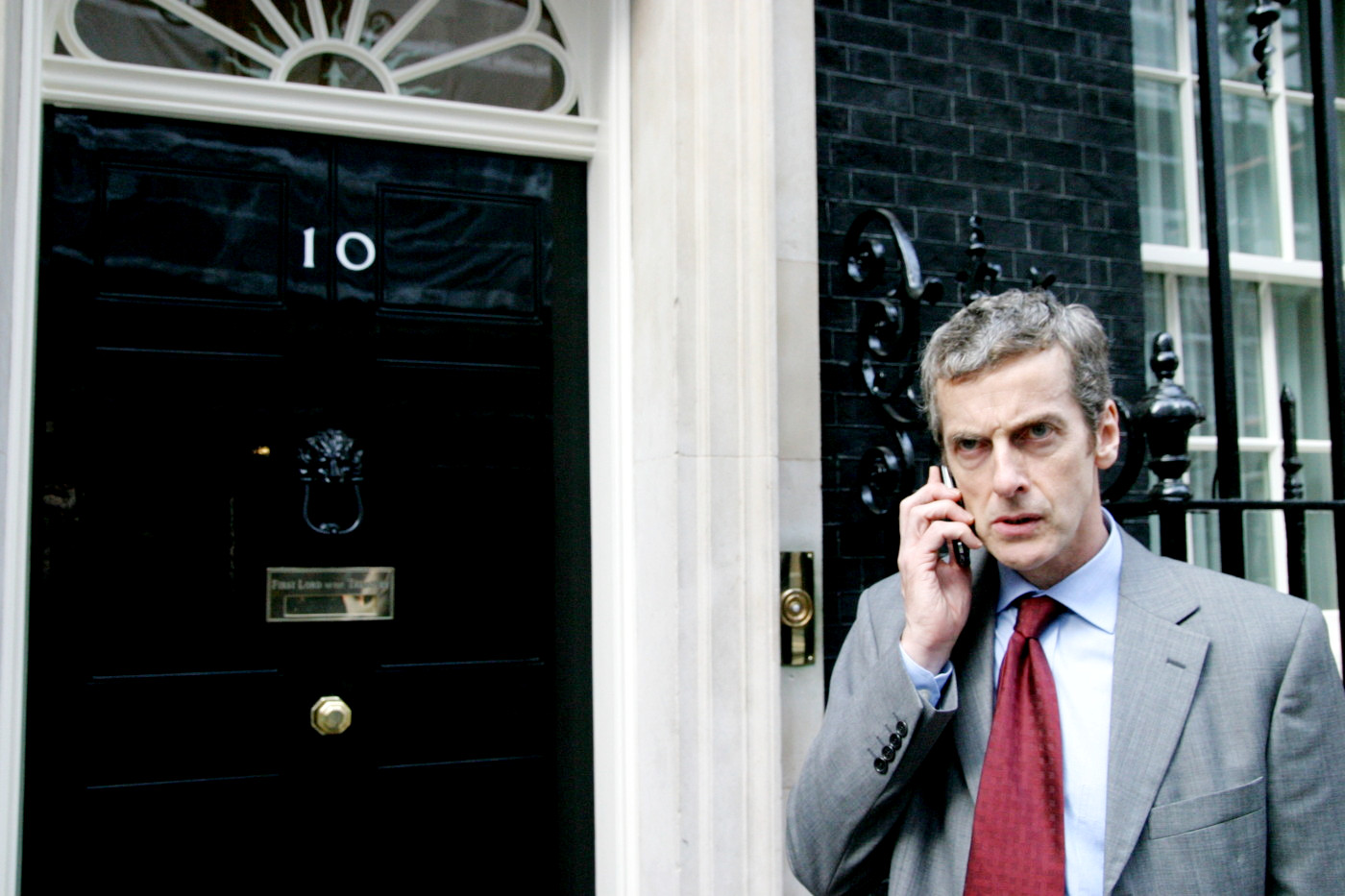
| From the original review: “[T]his is a gut-bustingly funny film. I honestly can’t remember the last time I laughed so hard in a theater. (Alas, it was probably 21 Grams, and that was for all the wrong reasons.) True, given that this is a sharp-edged, basically anti-Dubya political satire that goes out of its way to reward pop-culture geekery (Frodo, Ron Weasley, and the White Stripes are all used as epithets at one point or another), I’m probably as close to a target audience for this sort of movie that’s out there. Nevertheless, if your sense of humor runs anywhere from squirmathons like The Office UK or Curb Your Enthusiasm to sardonic political comedies like The Candidate or Bob Roberts to the current-events commentaries of Stewart and Colbert, this movie is a must-see. (And if you don’t find hyperarticulate Scotsman Peter Capaldi spewing forth rococo profanities funny just yet, you probably will after watching In the Loop.)”
From the year-end list: “I’m not normally a huge laugher at movies, but this flick had me rolling. Basically, In the Loop is Office Space for people in politics, and it’s a smart, wickedly funny entertainment. And like Judge’s film and The Big Lebowski, I expect it will enjoy a long, happy, and very quotable renaissance on DVD. If you find The Daily Show or Colbert Report at all enjoyable, this is a must-see. And, even if you don’t, well the choice Scottish swearing should get you through.“ |
How best to explain In the Loop? Perhaps a show of the wares. Ladies and Gents, I give you 10 Downing Street’s honorable, inimitable Malcolm Tucker (Peter Capaldi), and his strongly-worded request to Britain’s UN Ambassador that he reschedule a crucial Security Council vote: “Just f**king do it! Otherwise you’ll find yourself in some medieval war zone in the Caucasus with your arse in the air, trying to persuade a group of men in balaclavas that sustained sexual violence is not the f**king way forward!”
Or, Exhibit B: Here’s Mr. Tucker on the relative youth of his political counterparts in the White House: “His briefing notes were written in alphabetti spaghetti! When I left, I nearly tripped up over his f**king umbilical cord…Yeah, apparently, your f**king master race of highly-gifted toddlers can’t quite get the job done between breast feeds and playing with their Power Rangers. So, an actual grown-up has been asked to f**king bail you out!”
Now imagine two hours of these sorts of unspeakably filthy, top-shelf dressings-down, rat-a-tatting back and forth so quickly that you can barely keep on top of them all. That’s In the Loop, a hilarious tirade about the Dubya-Blair shenanigans in Iraq that I expect will definitely pass the test of time. After all, the topic is timely, but funny is timeless.

| From the year-end list: “An expertly-made, nuanced glimpse at the drug trade that was good enough to convince policymakers in Washington…of the inefficacies of fighting supply at the expense of demand. Gets better with repeated viewings.“ |
This is a movie that bounced back and forth with the very similar #14 before losing out to that fine production in the end, for reasons I will explain below. Nonetheless, Steven Soderbergh’s moody and cerebral dissection of the drug trade is a keeper. From Benicio del Toro’s compromised Mexican cop — a guy who just wants to do one thing right by his neighborhood — to Michael Douglas’ embattled and eventually embittered top drug warrior, Traffic is blessed with involving, multi-dimensional performances across the board. In fact, Soderbergh even figured out how to get the likes of John McCain and Orrin Hatch to support common-sense drug reforms: appeal to their vanity and put them in the movie.
Just as an aside, the Michael Douglas role in Traffic is one of many great parts that Harrison Ford, arguably the biggest box office draw of the 80’s and 90’s, turned down in the Oughts, along with a part in #14 below and several others. Instead, from the man who was Han Solo, Indiana Jones, Jack Ryan, etc., we got Crossing Over and Extraordinary Measures (and, of course, Crystal Skull). The upshot being, Ford needs a new agent, stat.
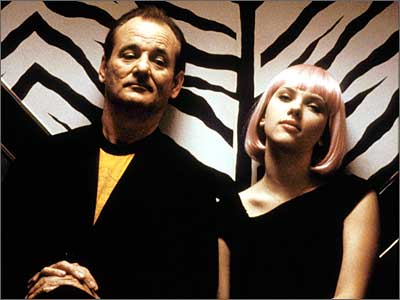
| From the original review: “[A]n unflinching look at the agony and torment of the human soul that is lying around your five-star Tokyo hotel with nothing to do…The film is funny, touching, sweet, often entrancing, and Bill Murray is really wonderful in the lead. It captures the disembodied detachment of travel insomnia and the exquisite anticipation of a newly-made connection in ways that belie the standard Hollywood older-man-meets-younger-woman narrative (Re: mogul wish fulfillment.) I do have nagging problems with Lost in Translation….But, not to lose the forest for the trees, I did quite like Lost in Translation. The film is honest and poignant in its depiction of two ships passing in the night, and Bill Murray – almost always good these days – is outstanding.”
From the year-end list: “It was fun for a while, there was no way of knowing. Like a dream in the night, who can say where we’re going? I still think Sofia Coppola cut a little close to the bone here in terms of autobiography…Still, I find this tale of chance encounters and foreign vistas has a strange kind of magic to it, and it has stayed with me longer than any other film this year. Bill Murray comes into full bloom in a part he’s been circling around his entire career…Lost in Translation has its problems, sure, but at it’s best it’s haunting, ethereal, and touching like no other film in 2003.“ |
More than this, you know there’s nothing…well, ok, except 14 other movies. Anyway, the problems I mentioned above still linger — the obvious score-settling aspects of Translation (Giovanni Ribisi and Anna Faris as Spike Jonze and Cameron Diaz respectively) are hard to watch, and Scarlett Johansson’s character should really just, you know, get out more — Being stuck in some po-dunk, one-horse town is one thing, being stuck in a five-star hotel in Tokyo is another thing entirely.
But, all that being said, Sofia Coppola’s Lost in Translation is still a very, very good film. It perfectly distills that weird amalgam of jetlag, culture clash, opportunity, and wonder that accompanies foreign travel. (As Tyler Durden put it in 1999, “If you wake up at a different time, in a different place, could you wake up as a different person?“) And it manages to realistically depict a nuanced, complex relationship that lies somewhere between friendship and romance, one that begins with a chance meeting and ends with a whisper. While Bill Murray tends to be the best thing about a lot of movies, neither he nor Scarlett Johansson — nor, for that matter, Coppola — have reached these heights before or since.
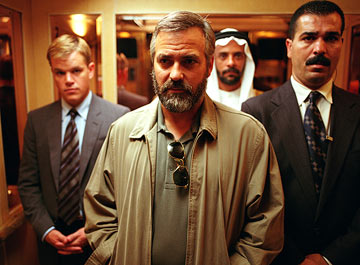
| From the original review: “While perhaps a bit too dry and convoluted for some tastes, Stephen Gaghan’s Syriana is, IMHO, a top-notch political thriller that’s easily one of the best films of the year. Admittedly…the movie definitely can be tough to follow. But, in a way, that’s part of its charm — Like the film’s protagonists, we only occasionally glimpse the shadowy tendrils of the beast that is Big Oil, and come to share their despair that it can ever be subdued. In sum…Syriana is both an intelligent, compelling work of cinema and a enthralling piece of social commentary, one that not only feels pertinent but necessary.”
From the year-end list: “I know Stephen Gaghan’s grim meditation on the global reach and ruthlessness of the Oil Trade rubbed some people the wrong way, but I found it a gripping piece of 21st century muckraking, in the venerable tradition of Ida Tarbell and Upton Sinclair. True, Christopher Plummer was a mite too sinister, but otherwise Syriana offered some of the most intriguing character arcs of the year, from morose CIA Field Agent George Clooney’s ambivalent awakening to corporate lawyer Jeffrey Wright’s courtship with compromise. In a year of well-made political films, among them Good Night, and Good Luck, Munich, Lord of War, and The Constant Gardener, Syriana was the pick of the litter.“ |
What Steven Soderbergh’s Traffic is to drugs, Stephen Gaghan’s Syriana is to the black gold, Texas tea. In fact, from tone to general approach to their subject, the films almost seem of a piece. (This probably shouldn’t be surprising. After all, Stephen Gaghan wrote the screenplay for Traffic, adapting it from the BBC mini-series.)
As I said, these two movies went back and forth. But I ended up putting Syriana above Traffic because — even with Christopher Plummer’s evil lynchpin figure involved — the latter film seemed messier and more ragged to me. Traffic ends with Don Cheadle getting an illicit wire up on Catherine Zeta-Jones’ inherited drug business, Benicio Del Toro winning a key victory, and Michael Douglas deciding to speak from the heart at a press conference, in the manner of movies since Mr. Smith Goes to Washington. But Syriana ends with Jeffrey Wright basically just switching teams, while Matt Damon and George Clooney survey the wreckage of a political assassination they could not prevent.
Neither movie is what you call a feel-good film, and both are cogent works of muck-raking done extremely well. But, even more than Traffic, Stephen Gaghan’s Syriana offers no feel-good escape or easy answer to one of the definitive political problems of our age. It just leaves us writhing on the hook.
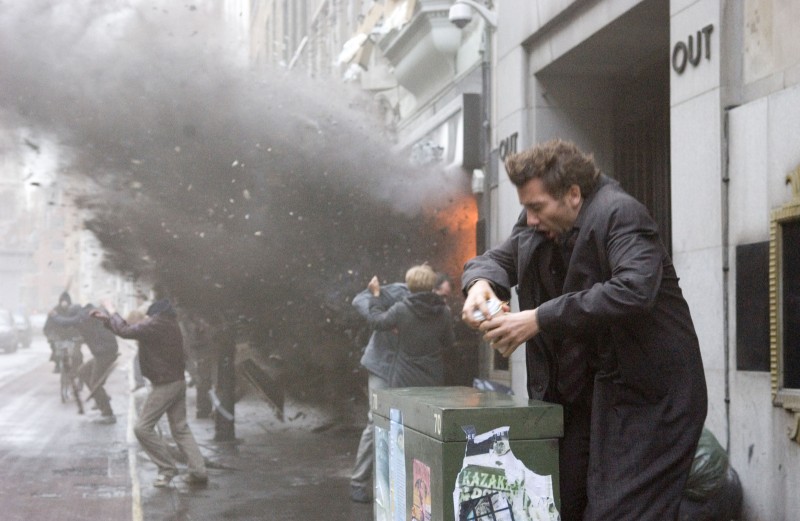
| From the original review: “Boasting a standout performance by Clive Owen…, great character work by Michael Caine, Chiwetel Ejiofor, and others; timely ruminations on issues ranging from the War on Terror to immigration reform; a wicked streak of black humor…; cinematography by Emmanuel Lubezki…that’s both striking and muted; and some of the most visceral urban-warfare scenes this side of Saving Private Ryan, the film has a lot in its corner, and is definitely worth checking out this holiday season.”
From the year-end list: “[O]ne of the most resonant ‘near-future’ dystopias to come down the pike in a very long while, perhaps since…Brazil. Crammed with excellent performances by Clive Owen, Michael Caine, Chiwetel Ejiofor and others, Children is perhaps a loosely-connected grab bag of contemporary anxieties and afflictions (terrorism, detainment camps, pharmaceutical ads, celebrity culture). But it’s assuredly an effective one, with some of the most memorable and naturalistic combat footage seen in several years to boot.“ |
From Brazil to Blade Runner, I’m always a sucker for a good, well-thought-out science fiction dystopia. And that’s what we got here with Alfonso Cuaron’s Children of Men, a smart and viscerally engaging sci-fi flick that riffed on everything from TMZ-style voyeurism (re: Baby Diego) to Big Pharma to anti-immigrant hysteria to, of course, the War on Terror. I still find the ending of the film a bit goofy, what with the highly-symbolic boat named Tomorrow and all that. But those long, drawn-out action takes more than make up for some occasional ham-handedness. And Clive Owen, Michael Caine, Chiwetel Ejiofor, and Julianne Moore, among others? That’s a Murderers’ Row.

| From the original review: “Eastwood’s first crack at Iwo Jima in 2006, Flags of our Fathers, was to my mind a well-meaning dog…[But] Letters is really something quite remarkable. A mournful, occasionally shocking testament to the inhumanity and absurdities attending war, and a elegiac dirge for those caught in its grip, even on the other side of the conflict, Letters from Iwo Jima is an impressive — even at times breathtaking — siege movie. And strangely enough, elements that seemed trite or intrusive in Flags — the desaturated landscape, the minimalist piano score — are truly haunting and evocative here.”
From the year-end list: “To some extent the Unforgiven of war movies, Iwo Jima is a bleakly rendered siege film that trafficks in few of the usual tropes of the genre…Instead of glorious Alamo-style platitudes, we’re left only with the sight of young men — all avowed enemies of America, no less — swallowed up and crushed in the maelstrom of modern combat. From Ken Watanabe’s commanding performance as a captain going down with the ship to Eastwood’s melancholy score, Letters works to reveal one fundamental, haunting truth: Tyrants may be toppled, nations may be liberated, and Pvt. Ryans may be saved, but even ‘good wars’ are ultimately Hell on earth for those expected to do the fighting.“ |
What with Space Cowboys, Blood Work, Mystic River, Flags of our Fathers, Changeling, Gran Torino, and Invictus (which I caught the other day — review to follow in 2010), Clint Eastwood had a very prolific Oughts, and no mistake. And yet, while his worst movie of this bunch, 2004’s Million Dollar Baby, turned out to be considerably overpraised (even inexplicably winning Best Picture that year), his best outing of the decade — Letters from Iwo Jima — got mostly overlooked.
If Unforgiven was the deconstruction of Clint’s earlier, vengeance-driven westerns, and Gran Torino the disassembling of his vigilante, Dirty Harry ethos, this film was his pointed riposte to the war movies of his past. By flipping the script and putting us all in the other guy’s shoes for once — in this case, with the doomed Japanese defenders in the caves of Iwo Jima — Eastwood made it clear that war is ultimately youths killing youths, whatever the principles at stake, and there is no glory in it. In fact, it is a callous, bloody, unforgiving, and loathsome business, and don’t let any movie tell you different.
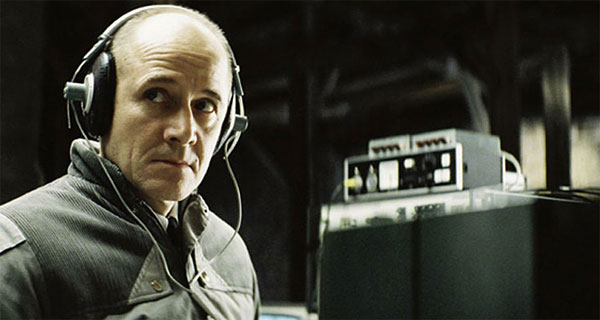
| From the original review: “I know very little about this subject, so I can’t vouch for how well van Donnersmarck recreates the rigors of East German life in the 1980s. Still, as an Orwellian parable of secrets and surveillance, The Lives of Others is a very worthwhile film, one strong enough to overcome some perhaps overly cliched moments of awakening by various characters along the way.”
From the year-end list: “[A] timely and compelling parable of art, politics, surveillance, and moral awakening in the final days of the Stasi. In a way, Lives is an East German counterpart to Charlie Wilson’s War, a story about how even small political acts of individual conscience can change the world, even (or perhaps especially) in a decaying Orwellian state. With a memorable central performance by Ulrich Muhe and a languid conclusion that ends on exactly the right note, the resoundingly humanist Lives of Others is a Sonata for a Good Man in Bad Times. We could use more of its ilk.“ |
One could argue, I suppose, that The Lives of Others is really just 1984 with a happy ending, as if O’Brien just had an epiphany over Beethoven one day and decided to go out of his way to save Winston and Julia (or Winston, at least) from the Ministry. And that would be a fair criticism — the motivations of Ulrich Muhe’s chief inspector do seem a bit underwritten as presented here. He listens to some good music, reads a play, sees a kid, and Blammo! We got ourselves a man on the inside!
Still, The Lives of Others worked for me, particularly if you consider that it takes place near the fall of the East German regime. With its long, Return of the King-like conclusion, this is arguably the story of not only life under the Stasi, but how Germany ultimately moved past it to reunification. And, all that aside, I thought Lives was a stirring example — or fable, perhaps — of how art, humanity, and conscience can successfully conspire against power, surveillance, and corruption. After all, bureaucracies are only as all-powerful and hegemonic as the humans that staff them, and, to paraphrase Leonard Cohen, those cracks are where the light gets in.
And now, the best ten films of the Oughts.
Hello all. This got sidetracked a bit on account of holiday rest, birthday carousing, and such — Yep, as of yesterday, I’m now 35 years young. (“I’m old, Gandalf. I may not look it, but I feel it…“) In any case, hopefully everyone has had time to check out part I and part II by now. And, just in time for New Years’ Eve, I’ve gone back to the movie-reviewing salt mines to dredge up Part III of the…
[The Rest of the List: 100-76 | 75-51 | 50-26 | 25-11 | 10-1]
[2000/2001/2002/2003/2004/2005/2006/2007/2008/2009]
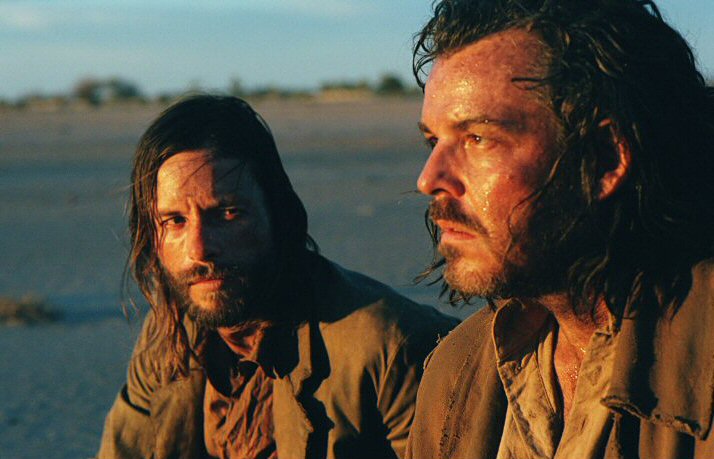
“Australia. What fresh hell is this?” As I noted in my review of his 2009 follow-up, The Road, John Hillcoat’s The Proposition was a movie I watched via Netflix late one night and felt like I had dreamed. There’s something very strange and ethereal at work here in this Nick Cave-penned western about an outlaw (Guy Pearce) sent to kill his ne’er-do-well brother (Danny Huston) by an equally ne’er-do-well lawman (Ray Winstone). (Well, I think that’s what it was about…I have a vague recollections of a filthy John Hurt talking his way in and out of trouble quite a bit too.)
Nonetheless, something about The Proposition makes it feel weirdly ancient and Biblical, like poetry and prophecy wrestling it out over an Outback campfire. I liked The Assassination of Jesse James by the Coward Robert Ford quite a bit — it’s on my almost list. But I get the sense that, in its heart of hearts, The Proposition is the movie Dominik’s sprawling epic really wanted to be.

| From the year-end list (I): “Another surprise…Matt Damon is believable, Chris Cooper and Brian Cox do excellent character work here, and Franka Potente and Clive Owen help lend the film an authentic European flavor that’s gone completely AWOL over in the Bond series…If the first film’s any indication, I’d rather see another Bourne than another Bond“
From the original review (II): “[T]hankfully The Bourne Supremacy is just as intelligent, fast-paced, gritty, and near-plausible as the first outing…The surprise here is how well everything’s executed — until the last fifteen minutes or so…the film moves at a kinetic, captivating clip.“ From the year-end list (II): “[A] better Bond than anything we’ve seen in the past 20 years. Paul Greengrass’ shakicam work here bodes well for Rorschach in The Watchmen.“ From the original review (III): “If you see him, say hello, he might be in Tangier. Or Paris, Madrid, London, New York, Moscow…uh, sir, we have Jason Bourne popping up all over the grid here. Shall I put it on One?…[I]t’s clear that Greengrass is firing on all cylinders right now. I was already impressed with him, but Bourne further suggests that Greengrass is among the very best directors working today — Let’s hope he shares with us more surveillance intel in very short order.“ From the year-end list (III): “The third installment of the Bourne franchise was the best blockbuster of the year, and proved that director Paul Greengrass can churn out excellent, heart-pounding fare even when he’s basically repeating himself. Really, given how much of Ultimatum plays exactly like its two predecessors on the page — the car chase, the Company Men, the Eurotrash assassin, Julia Stiles, exotic locales and cellphone hijinx — it’s hard to fathom how good it turned out to be. But Bourne was riveting through and through…You just couldn’t take your eyes off it.“ |
True, Agent 007 received a much-needed 21st-century reboot in the Oughts with Casino Royale. But the decade belonged to Matt Damon’s Jason Bourne, who yielded three exemplary cloak-and-dagger entertainments between 2002 and 2007. The Bourne Identity was the highlight of director Doug Liman’s decade, wherein he established the international flavor and CIA-professional mien that would characterize the rest of this spy trilogy. And Paul Greengrass brought it home, first with The Bourne Supremacy and then The Bourne Ultimatum. I know Greengrass’ brand of kinetic shaky-fu isn’t for all action tastes, but I find it totally absorbing. And, hey, while Bourne III might’ve been a lot like Bourne II in the end, at least there were no invisible cars anywhere in the picture.

| From the original review: “[W]hile I can’t vouch for how well Nolan conceals his own prestiges from the audience here, I found the movie a dark, clever, and elegant contraption, one that suggests razor-sharp clockwork gears and threatening pulses of electrical current, all impressively encased in burnished Victorian-era mahogany. If you’re a fan of Nolan’s previous work, or of sinister mind-benders in general, The Prestige is a must-see film. Either way, it’s among the top offerings of 2006 thus far.“
From the year-end list: “[A] seamlessly made genre film about the rivalries and perils of turn-of-the-century prestidigitation…Throw in extended cameos by David Bowie and Andy Serkis — both of which help to mitigate the Johansson factor — and The Prestige was the purest cinematic treat this year for the fanboy nation. Christian Bale in particular does top-notch work here, and I’m very much looking forward to he and Nolan’s run-in with Heath Ledger’s Joker in The Dark Knight.“ |
Having read the Christopher Priest novel beforehand, I was in on the trick with this movie going in. So I still don’t know how Christian Bale’s putty nose played to the uninitiated. (The nose plays?) Nonetheless, I found The Prestige one of the most satisfying genre entertainments of its year. And, while I haven’t seen it since, I expect this Christopher Nolan conjuration should hold up quite well. (And a special bonus for Nolan’s introducing us therein to one of my current movie crushes, Rebecca Hall.)
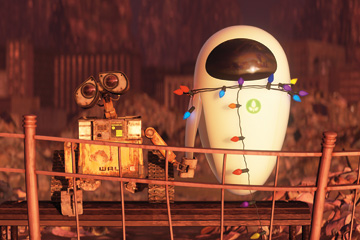
| From the original review: “Andrew Stanton’s ambitious, impressive WALL-E is definitely in keeping with the high standard we’ve come to expect from the Pixar gang…That the reach of WALL-E’s ambition ultimately exceeds its grasp in the second hour, when the movie becomes a much more conventional family flick, can’t be held too harshly against the film, I think…Still, after centuries of wandering around by himself, gazing at the stars, the Last Robot on Earth has fallen in love. Did we really need to contrive a second act to top that?“
From the year-end list: “If you saw one movie last year about a boy(bot) from the slums meeting — and then improbably wooing — the girl(bot) of his dreams, I really hope it was WALL-E. Hearkening back to quality seventies sci-fi like Silent Running, Andrew Stanton’s robot love story and timely eco-parable is a definite winner, and certainly another jewel in the gem-studded Pixar crown. I just wish it’d stayed in the melancholy, bittersweet key of its first hour, rather than venturing off to the hijinx-filled, interstellar fat farm.“ |
If WALL-E were just the opening forty-five minutes or so, it’d probably shoot up into the top 25, where it would rest next to another Pixar movie on this list. (Yes, in the immortal words of Yoda, There is another.“) But WALL-E started to lose me once our lovelorn robot left the junkyard and headed into space, and all the Starship Titanic goofiness on the back-end just can’t match the heart of the early going.
Still, in another decade of quality Pixar offerings, the first half of WALL-E was right up there among its finest productions. And, as I said in the year-end blurb above, this was the Slumdog Millionaire story of 2008 that i think will have the most staying power in the end.

While The Fantastic Mr. Fox will no doubt have its advocates in the years to come, the question up until this year has been whether 1998’s Rushmore or 2000’s The Royal Tenenbaums is Wes Anderson’s finest hour. Well, I can take or leave Jason Schwartzman, but it’s hard to bet against Bill Murray or Olivia Williams in a fight. Fortunately, for the purposes of this list, I don’t have to choose between them.
In a way, Tenenbaums is Exhibit A for a lot of Anderson’s usual extravagances, and they would definitely lose their lustre for me by the time The Life Aquatic with Steve Zissou and The Darjeeling Limited rolled around. Still, Tenenbaums works. The various idiosyncracies of each wing of the family don’t seem too belabored, not even the matching tracksuits. The hipster pop — be it Nico, the Velvet Underground, or Elliott Smith — seems pretty well-placed. And all the kitsch — and lordy, there’s a lot of it — still doesn’t quite overwhelm the story, as it would in later Wes Anderson offerings.
Plus, the basic point of Tenenbaums in the end is a sound one: All families are a bit weird when you get right down to it…ok, some more than others. But that doesn’t make them any less family. It’s an argument Paul Thomas Anderson tries to make in pretty much every one of his movies. This Anderson got it right here with The Royal Tenenbaums.

Ok, fair enough, I’m cheating a bit with this double-feature. Aside from their subject matter — both involve the death of Joy Division’s Ian Curtis, the clinically-depressed, epileptic Tory-leaning poet of the post-punk generation — these two films could hardly be any more different. Michael Winterbottom’s 24 Hour Party People, which centers on Factory Records founder Tony Wilson, is mostly farce, one that would introduce a lot of us outside England to the mad genius of Steve Coogan. Anton Corbijn’s Control, on the other hand, is a moody and naturalistic black and white piece following the rise and fall of a tortured artist that Corbijn knew personally, almost thirty years earlier.
Yet, for all their differences, both are superior and resonant films. And, taken together, they suggest how differently two movies can successfully approach the same tale. (Ok, 24 Hour Party People suggests Curtis was overwhelmed by Joy Division’s popularity among British neo-Fascists, while Control pins Curtis’ suicide more on girl trouble and general depressiveness – I tend to think Corbijn is closer to the mark.) Of course, out of the ashes of Joy Division came New Order, and while Bernard Sumner was never really the lyricist that Curtis was, that recombinated outfit has an admirable pedigree over the years as well. Endless talking, life rebuilding, don’t walk away.
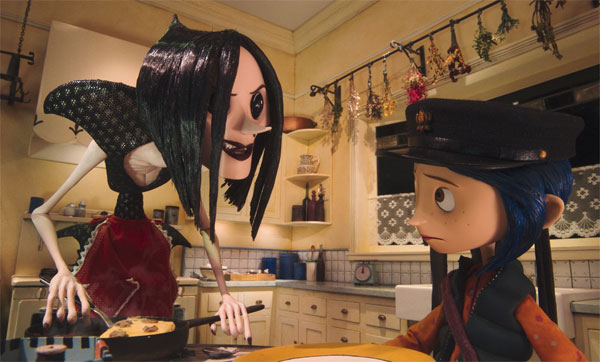
| From the original review: “Made with as much care and attention to detail as the best of Pixar…Selick’s clever Coraline is a children’s fable that moves with purpose, bristles with dark humor, and snaps together with satisfying, text-adventure logic. Like Dahl, Carroll, del Toro, and Rowling, Selick and Gaiman get that kids have more of an appetite for the unsettling and creepy than they’re often given credit for, and that the best fairy tales are often dark, scary places. Coraline is no exception…And in terms of the sheer wealth of imagination and meticulous craftsmanship on display, it’s hard to imagine that very many other films this year will be in Coraline’s orbit“
From the year-end list: “In an auspicious year for both regular and stop-motion animation, Henry Selick’s adaptation of Neil Gaiman’s Coraline was the pick of the litter. It sorta got lost in the early-year shuffle, but Selick & Gaiman’s dark, twisted fairy tale delivered the goods, and hopefully it’ll find more life on DVD. “ |
As I said just above, Henry Selick and Neil Gaiman’s dark stop-motion fable “gets” a simple truth about kids that much conventional children’s fare misses. A lot of little tykes — dare I say most? — are more than a bit twisted. They thrive on weird and scary and grotesque. And Coraline produces — It has the unsettling dream logic and elemental sense of scary that you find in Roald Dahl or the tales of the Brothers Grimm. And the stop-motion looks amazing — It manages to fashion an eerie, home-spun look that was perfect for the story and that CGI-sheen can’t (as yet) muster. Definitely worth a rental.
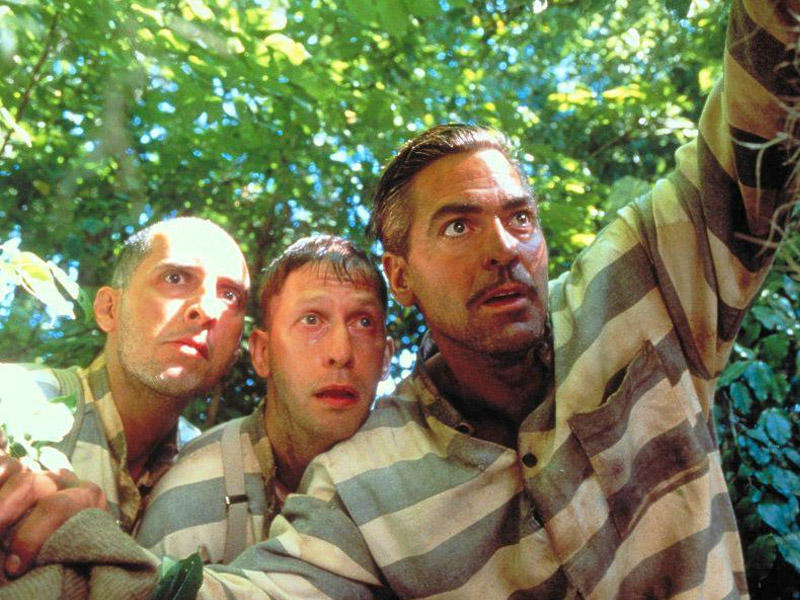
| From the year-end list: “To be honest, I wanted to like it more. Nevertheless, this amusing Coen paean to American folk and Faulknerian absurdity holds its own this year.“ |
Like every other Coen movie, O Brother is a film that rewards repeat viewings. And this Southern gloss on The Odyssey, by way of Preston Sturges, has definitely grown on me over the years. As with so much of the brothers’ output, things that tend to come off as bizarre non-sequiturs at first eventually seem like inspired lunacy once you vibe to it. (“Do not seek the treasure…“) Here’s hoping Burn After Reading ages similarly.
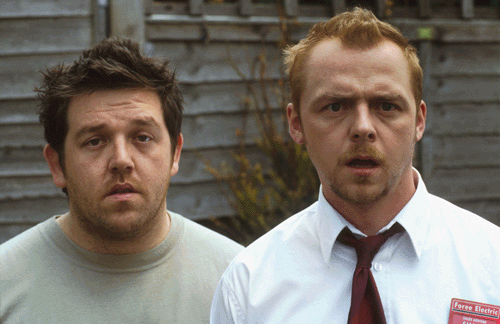
| From the original review: “A friend of mine saw the trailer for Shaun of the Dead and noted it looked like a zombie movie written by The Kinks. That’s actually a pretty good shorthand for this wry, witty film, although it eschews Ray Davies-like bitterness for a romantic comedy sweet that, for the most part, fits quite well. In fact, for the first hour or so, Shaun of the Dead is a total gas, particularly as Shaun and his couch-potato roommate Ed (Nick Frost) verrry slowly get wise to the shambling undead amidst them.“
From the year-end list: “Although it lost its footing shambling to its conclusion, Shaun of the Dead was great fun for the first two-thirds of its run, and it’s now probably my favorite zombie movie (everyone should have one.) A much-needed dry British humor fix to tide us over until Hitchhiker’s Guide.“ |
Zombieland may have aspired to the throne in 2009, but Edgar Wright’s Shaun of the Dead remains the original and undisputed king of the “rom-zom-coms.” Few movies this decade have been as endlessly rewatchable, and, if nothing else, Simon Pegg’s Shaun has provided me with a great Halloween costume over the years. (It’s worked much better than my stab at Donnie Darko, and makes for a great lithmus test to find the movie-people at any given Halloween party right away — not to mention the women-who-find-men-who-look-vaguely-like-Simon-Pegg-fetching, which, as you might have guessed, is a key demographic for yours truly.)
The Pegg-Frost-Wright follow-up Hot Fuzz didn’t make this list, alas, although it is a very entertaining village romp through cop-movie cliches. But here’s hoping that Scott Pilgrim vs. the World and, whenever it gets off the ground, Ant-Man, will make next decade’s top 100, come 2019.
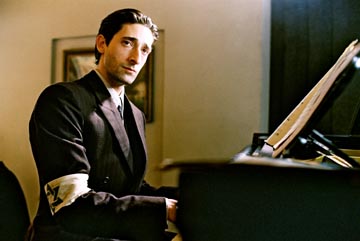
| From the original review: “The first half plays out as a well-done and unflinching (non-Spielbergized) look at life and death in the Warsaw ghetto. (Watching Adrien Brody step over the bodies of starved children on his way to work, I was briefly reminded again of how unbelievably unrealistic and offensive I found Roberto Benigni’s Life is Beautiful.) The second half, however, is a different story. When through a combination of luck and timely aid Szpilman finally manages to escape the ghetto, the film enters (at least to me) novel territory and becomes a strangely riveting and unfamiliar survival story.“
From the year-end list: “A 2002 film that I caught in March of this year, The Pianist is a harrowing and unique survivor’s tale that’s hard to watch and harder to forget (and I can’t have been the only person who thought post-spider-hole Saddam bore a passing resemblance to Brody’s third-act Szpilman.) Speaking of which, I said in my original review of Adrien Brody that ‘I can’t see the Academy rewarding this kind of understatement over a scenery-chewing performance like that of Daniel Day-Lewis in Gangs of New York.; Glad to see I was wrong.“ |
Just as I don’t ever cover Hollywood gossip here at GitM, I don’t really want to get into the kerfuffle that has reignited over Roman Polanski this past year. On one hand, what Polanski did was disgusting, reprehensible, and certifiably criminal, and there’s no getting around that. On the other hand, we just spent much of the past year basking in the afterglow of Michael Jackson’s contributions to music, and the King of Pop, by most plausible accounts, indulged in similar predilections. Imho, what’s good for the goose is good for the, uh, goose.
My point being, their personal lives aside, I still think Thriller is one of the best pop records of the past three decades, and The Pianist is one of the more powerful and engaging entrants in Holocaust cinema out and about. This is the story of the Holocaust outside the camps, and without that telltale Spielberg gloss. For most of the movie’s run, patently craven behavior and sheer blind luck are as crucial life-or-death determinants as anything else. And even if Brody’s pianist gets his own personal Oskar Schindler late in the film, the remorseless existentialism that drives Polanski’s worldview here — and most likely everywhere else, given the personal nature of this flick — has already been well-established by then. Not for the faint of heart, The Pianist feels sadly and uncomfortably true.

| From the original review: “Well, as you’ve probably heard, Knocked Up is both very, very funny and surprisingly real. For one, it’s got a funky, down-to-earth, DIY, lived-in feel that helps make it, along with Hot Fuzz, the most satisfying comedy of 2007 thus far. But Knocked Up also manages to be rather touching by the end, in a way that feels totally earned. The film doesn’t rely on cutesy baby antics or wildly improbable romantic flourishes to garner your affection, but rather on showing flawed, realistic, well-meaning people trying to make the best out of the complicated situations that make up life, be they modern love, marriage, or an unplanned pregnancy. As such, Knocked Up turns out to be a knock-out, and a very welcome special delivery.“
From the year-end list: “Judd Apatow’s sweet, good-natured take on modern love and unwanted pregnancy was probably the most purely satisfying film of the summer. As funny in its pop-culture jawing as it was well-observed in its understanding of relationship politics, Knocked Up also felt — unlike the well-meaning but overstylized Juno, the film it’ll most likely be paired with from now herein — refreshingly real. “ |
I almost put The Forty-Year-Old Virgin here, which is also very worthwhile in its way. But in a decade where American comedy seemed to be verging toward all-Apatow, all-the-time in its latter stages, Knocked Up was the former Freaks & Geeks auteur’s most fully-realized creation of the decade. (FWIW, F&G came out in 1999.)
It is also, as David Denby pointed out in one of his better moments, the apotheosis of the slacker-striver romance that characterized countless rom-coms and quasi-rom-coms of late, from About a Boy to The Break-Up to, for that matter, the next movie on this list. And more than 40-Year-Old-Virgin and more too than Juno, the other unintended pregnancy fable of 2007, Knocked Up — Seth Rogen’s palatial digs therein notwithstanding — felt like life in the Oughts as it really went down.
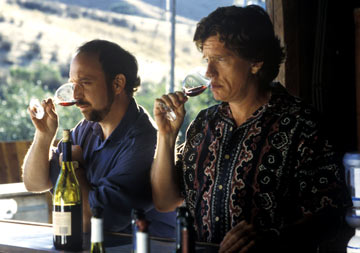
| From the original review: “In sum, Miles is almost completely beaten down by life…so of course he attracts the attention of a smart, beautiful woman (Virginia Madsen) who shares all his important interests and remains fond of him, even and despite his awful behavior. If you can get past this one critical and wholly improbable plot point (and I did, eventually), Alexander Payne’s Sideways is a trip to California wine country well worth taking. The movie basically plays like an approaching-middle-age version of About Schmidt (right down to the unfortunate nude scene), but this seemed a more well-rounded and generous film than its predecessor.“
From the year-end list: “Like a fine 1961 Cheval Blanc, Alexander Payne’s elegiac toast to California wine country and the regrets and indignities of middle-age has a tendency to linger in the senses. Paul Giamatti must tire of playing depressive, barely sociable losers, but he’s great at it here…Sideways isn’t as funny as Election, but it is a memorable trip.“ |
To be honest, I still find it hard to forgive Sideways its central conceit. Speaking of slacker-striver romances, what on earth would Virginia Madsen ever see in Paul Giamatti’s character? But that aside, Sideways was still one of the more memorable indy-dramedies of the decade, and, like wine and O Brother, it too has improved with age. (That being said, I still prefer Payne’s Election, but that was also part of the season of riches that was 1999.)
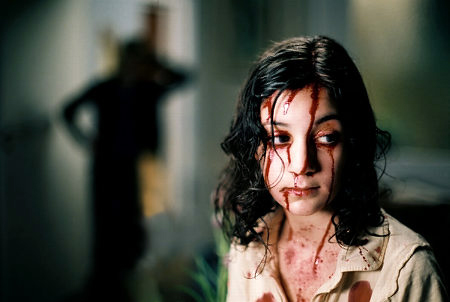
| From the original review: “A Swedish import that combines elements of the age-old vampire mythos with My Girl, My Bodyguard, and Morrissey (hence the title), Let the Right One In moves and feels like a particularly well-crafted Stephen King short story (or perhaps a bleaker version of one of Guillermo del Toro’s Spanish Civil War fairy tales), and definitely makes for a compelling nightmare before Christmas if you’re in the mood for it…[A]t times it feels as naturalistic, character-driven, and hyperliterary an endeavor as In the Bedroom or Little Children. There’s definitely some gore here and there, but as with the best horror stories, Let the Right One In is most frightening in the realm of ideas, and for what it doesn’t ultimately show or explain.“
From the year-end list: “As if living in public housing in the dead of a Swedish winter wasn’t depressing enough, now there’s a nosferatu to contend with… My Bodyguard by way of Ingmar Bergman and Stephen King, this creepy and unsettling tale of a very unsparkly pre-teen vampyrer will leave bitemarks long after you step out into the light.“ |
Y’all can keep your sparkling emo-Mormon vampires, thank you very much. (Although we would like Michael Sheen back when you’re done with him.) This creepy and understated Swedish horror story of 2008 pretty much filled my own quota for teenage nosferatu love for the decade. Yep, it’s a doozy, alright. And, not to get all Glenn Beck up in here, but you may leave as scared of life in Swedish socialist-style public-housing in the dead of winter as of the actual vampyrer at hand.
One word of caution: If you rent this film, watch it with subtitles — I once saw ten minutes of Let the Right One In dubbed and the whole enterprise seemed tonally off. Speaking of which, I’m averse to the idea of the forthcoming American remake, Let Me In, particularly given that it’s being brought to us by the director of Cloverfield. Still, I must concede, it has assembled a darned good cast: Chloe Moretz of (500) Days of Summer and Kick-Ass, Kodi Smit-McPhee of The Road, and Richard Jenkins as the handler, so to speak.
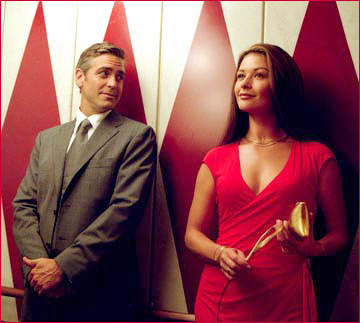
| From the original review: “I’m pleased to report that the Coens’ first foray into full-fledged romantic comedy (although one could argue for The Hudsucker Proxy) is an out-and-out winner. I’d heard earlier that the Coens had diluted their trademark zaniness for the sake of a mainstream audience this time around, but I found the reverse to be true — the brothers have instead juiced up what could have been a tired genre exercise (Imagine this film with Matthew McConaughey, Hugh Grant, Kate Hudson, or Sandra Bullock) with their unique flair and managed to create one of the best, funniest romantic comedies I’ve seen in some time.“
From the year-end list: “I expect I’ll be in the minority on this pick – This more-mainstream-than-usual Coen joint only got above-average reviews, and hardly anyone I’ve spoken to enjoyed it as much as I did. Still, I thought Intolerable Cruelty was a pop delight, 99.44% pure Coen confection…Light and breezy, yeah, but I thought it was that rare breed of romantic comedy that actually manages to be both romantic and hilarious…[I]t’s good to know we can always rely on the Coens for consistently excellent work, and I for one am greatly looking forward to The Ladykillers.“ |
Ok, so The Ladykillers didn’t work out so hot. Still, Intolerable Cruelty is a much-maligned film, in my opinion. Featuring George Clooney at the top of his Coen game and Catherine Zeta-Jones as a natural foil for his throwback, matinee idol looks, Intolerable Cruelty was a rom-com that, I thought, zinged with some of that old-Hollywood, His Girl Friday-type pizazz.
Ok, Geoffrey Rush is over-the-top here, and so are a lot of the jokes, from the Tenzing Norgay, “Heinz, the Baron Krauss von Espy” business to Wheezy Joe’s fatal inhaler problem. (For that matter, Cedric the Entertainer’s part seems tailor-written for Jon Polito, and the Coens eventually re-used the really-old law partner joke in here for the Rabbi Marshak in A Serious Man.) Still, the cat-and-mouse romance at the center of Intolerable Cruelty works quite well, and it’s a great deal of fun to watch play out. Try it, you’ll like it.
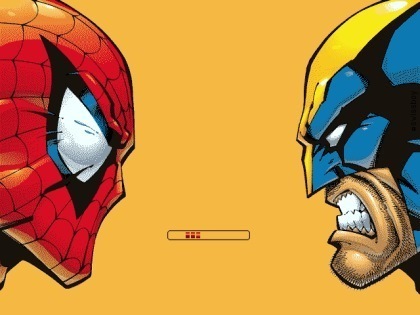
| From the original review (X2): “I’m not sure how it’ll play to people who didn’t grow up on the comic, but last night’s midnight showing of X2 was much better than I had anticipated. Offhand, I can think of three setpieces (Nightcrawler at the White House, the assault on the mansion, and Magneto’s escape) that were the closest thing to fanboy pr0n I’ve seen in ages (LOTR notwithstanding), and that’s not counting all the great little flourishes and knowing winks throughout…Sure, the film drags a bit in the last twenty-five minutes or so (as they set up X3), but overall Singer & co. hit this one out of the park.“
From the year-end list (X2): “Laugh if you want, but I can’t think of any other movie where I had more fun this year. Arguably the most successful comic film since Superman 2, X2 improved over its rather staid predecessor in every way you can imagine…X2 was ripe with moments that seemed plucked directly out of the comics, if not straight out of the fanboy id. To me, my X-Men.“ From the original review (S2): “Here he comes, watch out bud. He’s got genetically engineered blood…and a frozen run of bad luck like you read about. After a series of underwhelming summer films so far, Spiderman 2 is a happy surprise, and a distinct improvement on the decent original. After an up-and-down first outing, both Sam Raimi and Tobey Maguire (as well as the gaggle of writers on board, among them Michael Chabon) have clearly settled into the rhythm of Peter Parker’s struggle-filled existence, and the result is the most enjoyable and faithful comic book adaptation this side of X2.“ From the year-end list (S2): “A definite improvement on the first adventure of your friendly neighborhood wallcraller, Spiderman 2 was a perfectly made summer film that stayed true to the spirit of Peter Parker. Along with X2, this is the gold standard for comic book-to-film adaptations right now.“ |
Eh, you know, in the end, I just couldn’t decide. With the onerous origin stories out of the way in each of their respective first films, Bryan Singer’s X2 and Sam Raimi’s Spiderman 2 were both a chance to let these beloved characters’ freak flags fly. And, taken together, they were the highlight of Marvel movie-watching in the Oughts. Even more than Batman’s much-heralded second outing this decade (still ahead of us on this list) there are scenes in both X2 and Spiderman 2 that feel like four-color panels come to life, from Spidey crawling on the ceiling while talking smack to Doc Ock to Magneto chuckling with glee while floating away from his until-recently-inescapable glass prison.
Both franchises hit a serious wall in their third outings, of course — the poor, long-suffering mutants more so than our friendly neighborhood wallcrawler. Still, both X2 and Spidey 2, like Stephen Norrington’s Blade, Jon Favreau’s Iron Man, and hopefully Kenneth Branagh’s upcoming Thor, proved that certain Marvel franchises can be very translatable to the screen when left alone in the right hands.

| From the original review: ““I’m an old broken-down piece of meat and i deserve to be all alone. I just don’t want you to hate me.” If that’s your man, then tag him in: The final and best film of last Friday’s four, Darren Aronofsky’s The Wrestler is a downbeat, moving, and resonant character study of a man past his moment. If Frost/Nixon was the ‘feisty underdog takes on the champ’ Rocky movie of the day, The Wrestler captured the other half of that famous story — the aging athlete shuffling around his ‘real’ life, looking for any place he can make sense of himself outside the ring…I wouldn’t cry foul if The Wrestler manages to pin down Oscars for Rourke and/or Tomei, and it’s too bad Aronofsky got locked out of Best Director contention this year — dabbling in the ‘rassling form has clearly been good for him.“
From the year-end list: “Have you ever seen a one-trick pony in the fields so happy and free? Me neither, to be honest, but Aronofsky’s naturalistic slice-of-life about the twilight days of Randy “the Ram” Ramzinski was likely the next best thing. I don’t know if Mickey Rourke will experience a career resurrection after this performance or not. But he won this match fair and square, and nobody can take it from him.“ |
Displaying an understatement and naturalism one wouldn’t guess he possessed after Pi, Requiem for a Dream, and The Fountain, Darren Aronofsky hit one out of the park with The Wrestler, thanks in large part to Mickey Rourke’s turn as, well, Mickey Rourke. With key support by Marisa Tomei (who had a much-better decade than 1992’s My Cousin Vinny would ever have predicted), The Wrestler was an-almost perfect match between actor and role, and a small but very effective movie about the indignities accompanying an aging and forgotten warrior’s latter days. Another round to the Ram.
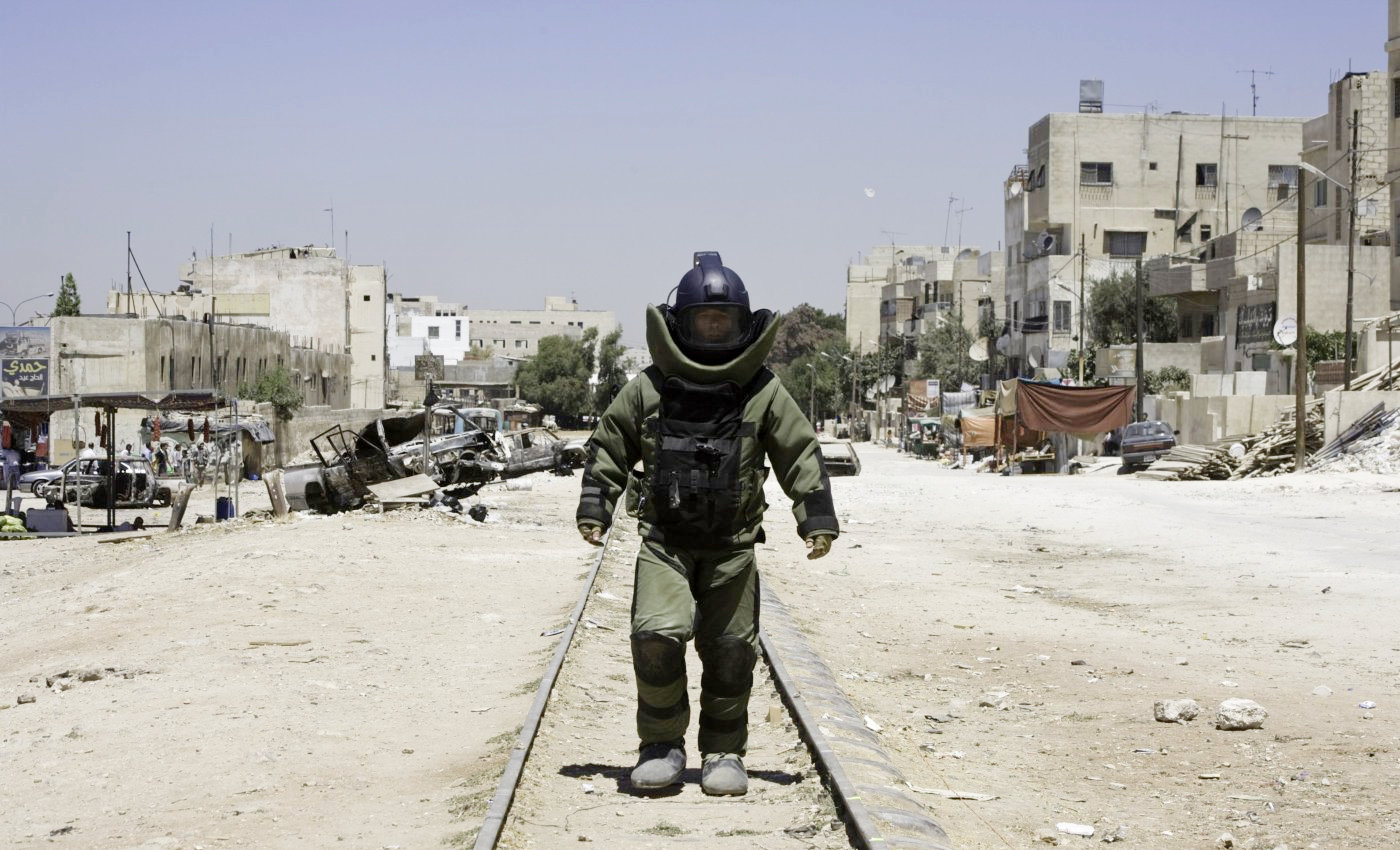
| From the original review: “A taut, minimalist “men-in-combat” thriller that immediately goes up on the top shelf of Iraq flicks next to HBO’s Generation Kill (and, if you’re counting Gulf War I, Three Kings), The Hurt Locker is also that rare thing in the summer of Terminator: Salvation, Transformers, and GI Joe: a war movie for grown-ups…In vignette after vignette, The Hurt Locker ratchets up the suspense by degrees, until you find yourself — like the EOD team we’re following — living out each moment in a heightened state of tension, endlessly waiting for the other shoe to drop. It’s an impressive moviemaking feat, and it helps to make The Hurt Locker one of the best films of the year.“
From the year-end list: “Bombs away, and we’re not ok. Other than Modern Warfare 2 and Generation Kill, this immersive, nail-biting account of an IED team’s travails in the midst of the suck was the best pop culture simulator out there for feeling embedded in Iraq…and stuck at the wrong Baghdad street corner at just the wrong time. And with the tension ratcheting to uncomfortable levels in each of the ordnance disposal scenes, Kathryn Bigelow’s The Hurt Locker…was the action movie of the year.“ |
Of course, warriors’ glory days aren’t all that much better, as evidenced by Kathryn Bigelow’s tense and sparing The Hurt Locker. But, as with Randy the Ram, Jeremy Renner’s Staff Sgt. William James has a taste — some might say addiction — for the ring.
Like the IED team it follows, Bigelow’s movie succeeds mainly because of its attention to detail — not only in ratcheting up the unbearable tension throughout, but in the little moments. Say, for example, the scene with Jeremy Renner in that suddenly ridiculous-looking American supermarket, or his interactions with the locals (both the kid selling DVDs, and the “safe” house he finds himself in later.) The Hurt Locker doesn’t really offer three-part character arcs or easy-to-digest answers — It just puts you right in the thick of danger, with all the fear and excitement that portends. War is a drug, indeed.

| From the original review: “He may seem cruel and indifferent. He may even be vain and jealous (Exodus 20:5.) Still, thank HaShem for the Coens! Like manna from Heaven, the brothers are the cinematic gift that keeps on giving. At this late date, you probably know if you vibe to the Coen’s mordantly kooky aesthetic or not. And if you do, A Serious Man, their sardonic reimagining of the Book of Job set in late-sixties Jewish suburbia, is another great movie in a career full of them…A word of warning, tho’ — Despite the funny on hand here, and there is quite a bit of funny, in a way this world may be the Coens’ darkest yet.“
From the year-end list: “Oy vey. This existential disquisition into wandering dybbuks, sixties Judaica, quantum mechanics, and Old Testament justice was yet another triumph for those devilishly talented brothers from Minnesota. The Job-like travails of Larry Gopnik introduced us to several colorful, Coenesque personages (Sy Ableman, Rabbi Nachtner) and offered vignettes (the Goy’s Teeth) and quotable philosophy (“Receive with simplicity everything that happens to you”) that cinephiles will ponder for awhile to come. The Coens abide.“ |
In another decade of solid-to-great offerings, A Serious Man was Joel and Ethan Coen’s best comedy of the Oughts, particularly for those who like their Coen craziness straight from the tap. Going home to Minnesota for this inquiry into Judaism, mathematics, and the meaning of it all clearly brought out the best in the brothers, and the Coens ended the decade as they began, in lean, fighting trim. Whether it’s Hail Caesar! or True Grit, keep ’em coming, guys. Each Coen movie is a mitzvah for the rest of us.
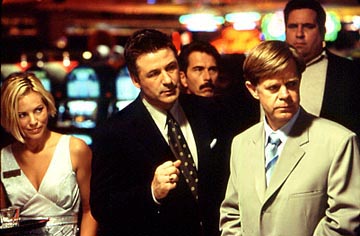
| From the original review: “True, you can guess where this is basically going from the opening moments. The Cooler is ultimately a brief genre exercise in noir romance – It’s not reinventing the wheel. But the wry script takes a few jags I wasn’t expecting, and Kramer, Macy, and Bello succeed in fashioning two lovebirds who veer from playful to amorous to desperate for each other in a way that belies the cookie cutter courtship of so many other films…[I]f you can stomach the occasional burst of Old Vegas-style mob brutality (usually at the hands of Baldwin), The Cooler is a testament to the notion that even perennial losers can sometimes catch a lucky break, and a touching character-driven romance well worth checking out.“ |
Word is the rest of the decade didn’t go so hot for director Wayne Kramer, what with 2006’s Running Scared and 2009’s Crossing Over. (I didn’t see either…did Crossing Over even come out?) But The Cooler, a magical-realist tale about the mystifying blessings of Lady Luck, was one of my favorite movie romances of the Oughts…and one that side-steps the Madsen-Giamatti Sideways problem with a key second-act twist. William H. Macy and the very underrated Maria Bello both bring their A-game to this Vegas fable, and Alec Baldwin does yeoman’s work in the type of meaty character role he’d make his own as the decade unwound. Who knows? Maybe luck was just shining on Kramer that year.
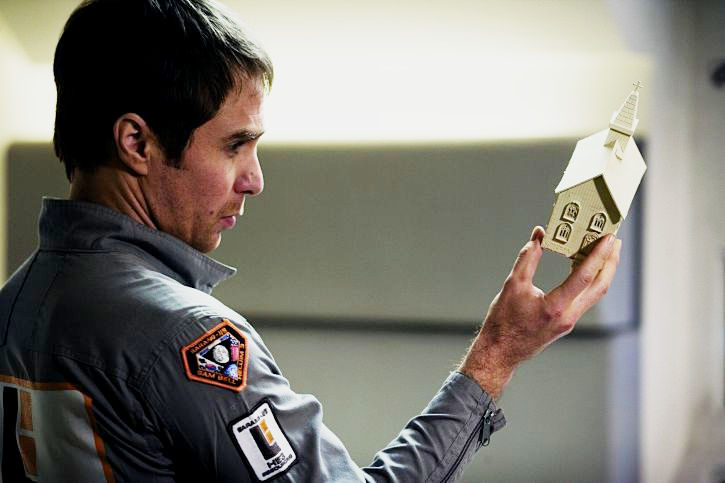
| From the original review: “Granted I tend to be a sucker for these sorts of films, which are far too rare nowadays…Nevertheless, I found Duncan Jones’ low-key, hard-sci-fi rumination Moon to be really, really great — exactly the sort of small-budget ‘big think’ science fiction production that it feels like you used to see a lot more of back in the day. (Silent Running, Outland, even stuff like Capricorn One and Soylent Green.)…Sure, I probably saw this film under ideal conditions for the subject matter — by myself at the 11:45pm showing — but I was riveted by it. And if you’re a science fiction fan (or a fan of Sam Rockwell, who’s showcased here to great effect), Moon is a must-see.“
From the year-end list: “While Michael Bay, McG and their ilk tried to top each other with gimongous explosions this summer, Duncan Jones’ moody, low-key Moon just aimed to blow our minds. A throwback to the seventies big-think sci-fi that has fallen out of favor in the post-Star Wars-era, Moon’s big special effect, other than Sam Rockwell, of course, was its clever ideas. And in a year of hit-or-miss (mostly miss) blockbusters, Rockwell’s quiet two-man show turned out to be the sci-fi extravaganza of 2009.“ |
I feel like I’ve been chatting up this movie quite a bit lately. Still, in case y’all missed the thread, I really dug Duncan Jones’ Moon. It’s all of a piece — A small, well-thought-out, and low-fi flick that just aims to tell an interesting science fiction tale and get you thinking, no more, no less. And amid the sturm und drang of Bayhem and McG’s killer robots and Cameron’s Pandora in 2009, I thought Moon‘s relative silence spoke volumes.
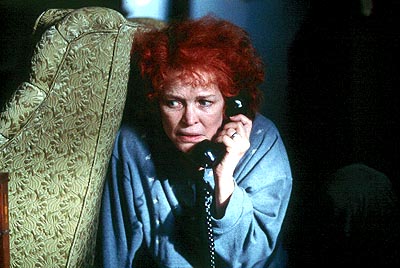
| From the original review: “Technically, Requiem is a masterpiece. Darren Aronofsky pulls out every visual effect and cinematic sleight of hand he previewed in Pi, and then some, to great effect. There are some truly unforgettable moments in this movie, although I must admit that — very occasionally — the technical razzmatazz does get in the way…[D]espite…substantial problems, Requiem is a powerful, enthralling film that invites comparison with such downer classics as A Clockwork Orange and Taxi Driver. Two days later, I’m still mulling it over in my head. I’m not sure if I completely enjoyed it, but I do know I must recommend it.“
From the year-end list: “Powerful, dazzling, and a technical masterpiece, despite the flawed ending. Gets stuck in your head like bits of food get stuck in your teeth.“ |
Ah, Requiem for a Dream. In many ways, I tend to think this flick is wayyyy too over-the-top to be taken at all seriously. And by hyperaccentuating the extreme negatives of drugs here, what with the gangrenous limbs and heroin-fueled whoredom and whatnot in its final act, it sorta misses out on the reasons why people tend to take drugs in the first place. (Hint: They may in fact be enjoyable at times.) In that sense, at its worst moments, Requiem for a Dream can be as hyperbolic, monotone, and quite frankly ridiculous as a Nancy Reagan “Just Say No” ad.
But, for all of its occasional this-is-your-brain-on-drugs ludicrousness, Darren Aronofsky’s Requiem is undeniably a powerful and hypnotic movie experience. Between Ellen Burstyn even outdoing Bale’s American Psycho that year in a just-go-for-broke performance — I still think she got cheated out of the Oscar — and the droning, brain-slashing score by Clint Mansell and the Kronos Quartet (now a staple of movie trailers, thanks to The Two Towers), Requiem has moments that are still burned into my skull a decade later.
And with one clever film conceit, Aronofsky vividly captured one facet of addiction that rings all too true, whether your vice is cigarettes, heroin, TV, or Oreo cookies: Half of the draw — well, maybe not half, but a sizable chunk, at least — is the comfortable routine of a process. I guess that’s why they call it a habit.
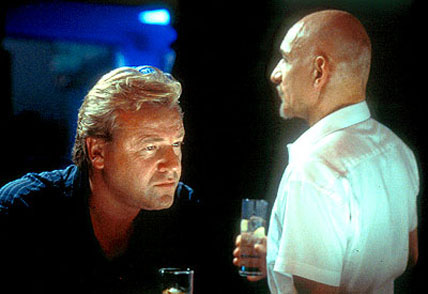
True, Ben Kingsley’s surprising turn as a foul-mouthed Cockney madman is a bit of a gimmick. (In fact, Ralph Fiennes later used said-gimmick himself in 2008’s In Bruges.) Still, Jonathan Glazer’s Sexy Beast was a smart and funny crime thriller that introduced many of us to the venerable Ray Winstone (although Wikipedia now informs me he’s been around since Quadrophenia) and that anticipated Ian McShane’s later breakout/comeback as Al Swearingen of Deadwood. (Spoiler alert: It’s also one of two movies here in the twenties that involve supernatural leporids.) And to my mind, some of the inspired England v. Spain riffing herein just never gets old.

| From the original review: “Arguably the best film about the realities of politics since Charlie Wilson’s War, Milk is blessed with excellent performances across the board — most notably Sean Penn, James Franco, and Josh Brolin, but also supporting turns by Emile Hirsch, Alison Pill, and others. And as a chronicle of a key moment in an ongoing civil rights struggle, Milk also feels like a watershed film of its own in its approach to its gay and lesbian characters. In short, it’s one of the best films of 2008.“
From the year-end list: “What with a former community organizer turned ‘hopemonger’ being elected president — while evangelicals, conservatives and sundry Mormons inflicted Proposition 8 on the people of California — Gus Van Sant’s vibrant recounting of the tragedy of Harvey Milk was obviously the timeliest political movie of 2008. But, in a year that saw entirely too much inert Oscar-bait on-screen in its final months, Milk — romantic, passionate, and full of conviction — was also one of the most alive. While it extends some measure of compassion even to its erstwhile villain (Josh Brolin), Milk is a civil-rights saga that harbors no illusions about the forces of intolerance still amongst us, and how far we all still have to go.“ |
A film that put the lie to Brokeback Mountain‘s Kabuki-theater austerity to some extent, Gus Van Sant’s Milk featured gay couples that were more passionate, more realistic, and, perhaps most importantly, more matter-of-fact than those decidedly not co-habiting in Ang Lee’s Wyoming. Unlike the tragedy of Jake and Heath (or 1993’s Philadelphia, for that matter), it showed mainstream (straight) audiences that being gay isn’t, or at least shouldn’t be, a matter of life and death. In fact, gay couples are a lot like straight couples — varied, heterogeneous, often in lust, sometimes in love.
And its sexual politics aside, Milk was also a smart and insightful film about our American political system as a whole — maybe especially in the year of Candidate Obama and Prop 8, but just as much so today. After all, the struggle for real change in America didn’t end when Harvey Milk got elected. It was only just beginning.

| From the original review: “[A] smart, stylish, and sublimely smooth British crime film that does Guy Ritchie’s Lock, Stock, and Two Smoking Barrels and Snatch one better…Essentially, you know the drill — this is a puzzle film in which you’ll have to listen carefully and learn to distinguish between various delinquents with names like Tiptoes, Kinky, Slasher and Shanks. And, while the final few grifts just get a bit too big to be believable, for the most part the story holds together with intelligence and verve, in no small part to Daniel Craig, who’s a magnetic presence here, and Matthew Vaughn, who displays a crisp, confident direction that’s all the more impressive for being showy without ever seeming flashy.“
From the year-end list: “If X3 turns into the fiasco the fanboy nation is expecting with Brett Ratner at the helm, this expertly-crafted crime noir by Matthew Vaughn will cut that much deeper. Layer Cake not only outdid Guy Ritchie’s brit-gangster oeuvre in wit and elegance and offered great supporting turns by Michael Gambon, Kenneth Cranham, and Colm Meaney, it proved that Daniel Craig had the requisite charisma for Bond and then some (and that Sienna Miller is no slouch in the charisma department either.)“ |
In retrospect, Casino Royale should probably have been listed as one of the honorable mentions in the first quarter of this list. Nonetheless, Daniel Craig first proved he had the chops for 007 — and then some — with his star turn in this well-made and very entertaining Cockney crime drama. And he’s only the pick of the litter here: Layer Cake also includes wily hands Michael Gambon, Colm Meaney, Jamie Foreman, Kenneth Cranham, and George Harris, as well as able performances by others soon-to-break-out like Ben Whishaw, Tom Hardy, and Sienna Miller. (Sure, one could argue Tom Hardy of Bronson “broke out” as the evil Picard clone in 2002’s Star Trek: Nemesis. But did you see Star Trek: Nemesis? Being in that movie should be considered the opposite of breaking out, I should think.)
True, Matthew Vaughn’s Stardust turned out to be amiable and mostly forgettable for me. But, if I’m holding high hopes for his Kick-Ass in 2010, it’s because of Layer Cake, a movie that just got edged out of the top twenty-five. Along with…

| From the original review: “Seduced in by this teaser (and the accompanying song, Frou Frou’s “Let Go”, which has been flitting about my head for days now), I entered expecting a stylish but showy and self-indulgent film, as befitting a first-time triple threat. (At worst, I feared something along the lines of a Whit Stillman or P.T. Anderson flick.) But Garden State feels not only intelligent and confident but grounded, understated, and, like its dazed, over-medicated protagonist, even somewhat self-effacing. More than anything, I found the movie a sweet, quirky, and good-natured tone poem about awakening to both the pain and the possibilities of the life around you.“
From the year-end list: “Writer-director Zach Braff’s ‘anti-Graduate’ debut was a small but touching ode to home that, along with reviving Natalie Portman as an actress and offering the best soundtrack of the year, delivered exactly what it promised. A bit hokey at times, sure, but Garden State wore its heart on its sleeve and, for the most part, got away with it. It was a witty and eloquent voyage to the Jersey burbs and a testament to the proposition that as Paul Weller put it, it’s never too late to make a brand new start.“ |
As I’ve said many times, Zach Braff’s Garden State is a bit of a guilty pleasure, but perhaps I should stop making excuses for it. It had the closest thing to a Pulp Fiction-like era-defining soundtrack that the Oughts saw, with cuts by Frou Frou, The Shins, Colin Hay, and Iron & Wine. It had a cast stocked with quality, A-list talent like Ian Holm, Peter Sarsgaard, and the inimitable thespian Method Man. (Where my cheese at?) It managed to bring Natalie Portman back to life after her near-fatal submersion in George Lucas’ green-walled CGI prequel tank. And, like Moon, it was a small film that delivered about exactly what it promised.
In short, Garden State is pretty close to a modern version of the movie it so often references, The Graduate. (Or, at least, it’s a heck of a lot closer to The Graduate than 2005’s Rumor Has It, which more explicitly tried to make that claim.) What can I say? For me, at least, Garden State delivered.
25, 25 movies to go…and here’s the next 15.
Merry Christmas, everyone. As we’re at the halfway point of the big decade list — Pt. 1, Pt. 2 — now seems like a good time to uncork the usual end-of-year movie list. Think of it as a new-stuff sorbet before we move to the final fifty.
I should say before we start that there are a few movies I’ll very likely see from 2009 — most notably The Lovely Bones, A Single Man, and The Imaginarium of Dr. Parnassus — that aren’t included due to their limited release schedule — most don’t arrive around these parts until 2010. The better-than-expected Sherlock Holmes, which I saw yesterday and have not yet reviewed in full, is also not here, although I did think of slotting it in at #20 before the Victorian-era tazer and remote-controlled cyanide bomb showed up. And there are still a few other stragglers I wouldn’t mind catching at some point, most notably Invictus and The Messenger. But if any of these are really, really great, they’ll either get backdated in or show up in next year’s list, as per usual. So don’t worry — credit will get paid where due.
In the meantime, as has been the standard — and although the decade list has been working differently — we start at #1 and proceed from there. And without further ado, the…
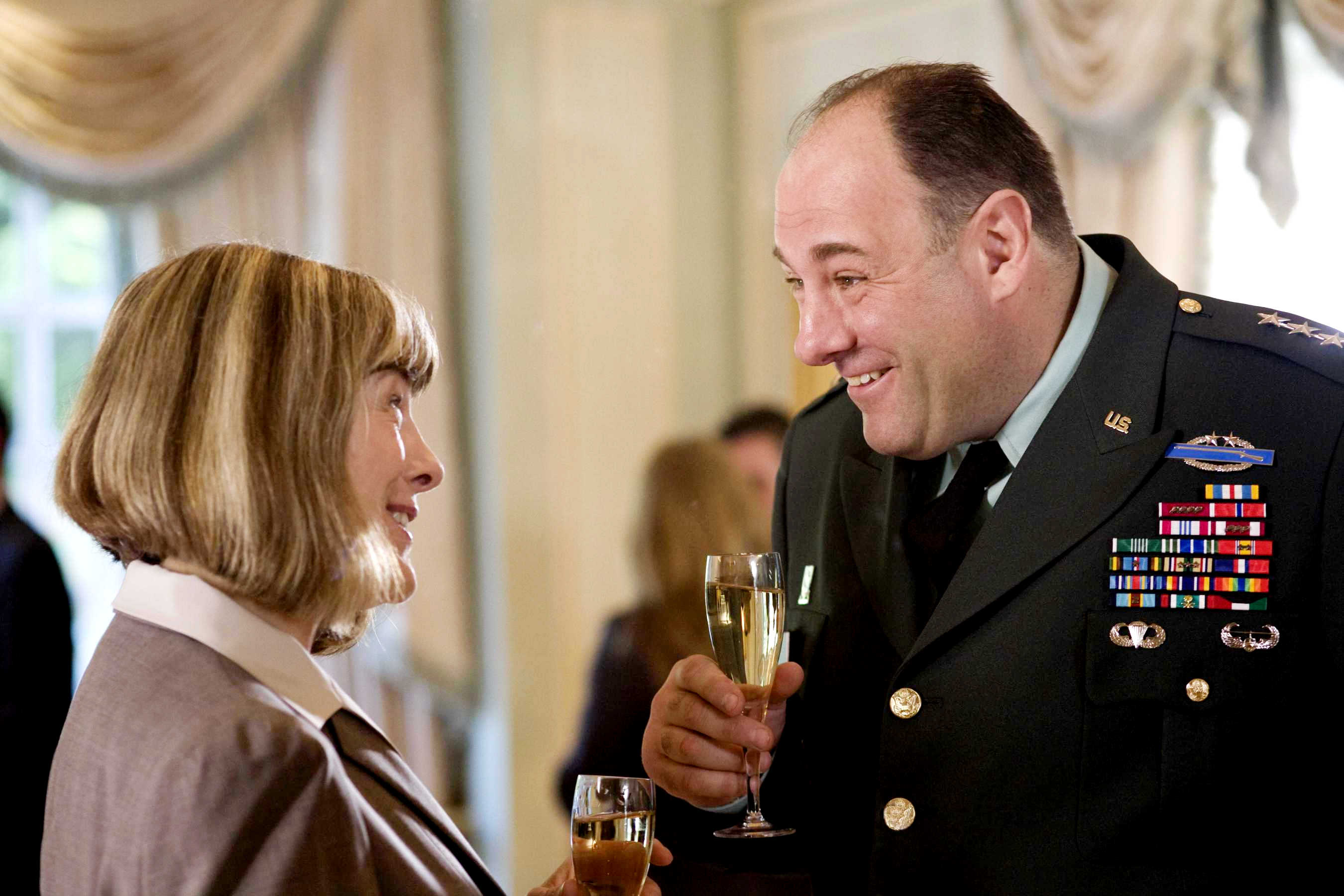
1. In the Loop: “Tobes, I don’t want to have to read you the Riot Act, but I am going to have to read you some extracts from the Riot Act, like: Section 1, Paragraph 1: Don’t leave your boss twisting in the wind and then burst in late, smelling like a pissed seaside donkey.” Even if I hadn’t moved back to DC this year for a ringside seat to the clusterfrak, Armando Ianucci’s In the Loop would’ve been at the top of my list. I’m not normally a huge laugher at movies, but this flick had me rolling.
Basically, In the Loop is Office Space for people in politics, and it’s a smart, wickedly funny entertainment. And like Judge’s film and The Big Lebowski, I expect it will enjoy a long, happy, and very quotable renaissance on DVD. If you find The Daily Show or Colbert Report at all enjoyable, this is a must-see. And, even if you don’t, well the choice Scottish swearing should get you through.

2. Moon: While Michael Bay, McG and their ilk tried to top each other with gimongous explosions this summer, Duncan Jones’ moody, low-key Moon just aimed to blow our minds. A throwback to the seventies big-think sci-fi that has fallen out of favor in the post-Star Wars-era, Moon‘s big special effect, other than Sam Rockwell, of course, was its clever ideas. And in a year of hit-or-miss (mostly miss) blockbusters, Rockwell’s quiet two-man show turned out to be the sci-fi extravaganza of 2009.
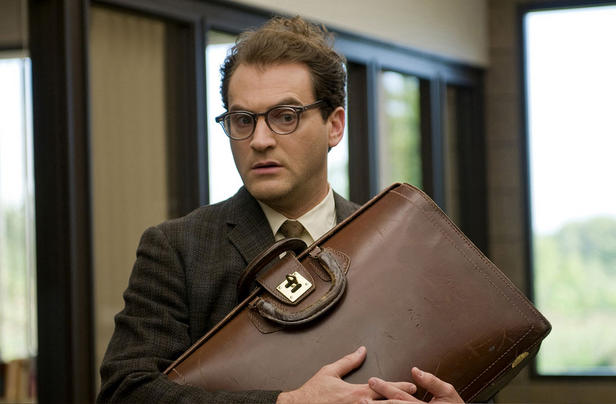
3. A Serious Man: Oy vey. This existential disquisition into wandering dybbuks, sixties Judaica, quantum mechanics, and Old Testament justice was yet another triumph for those devilishly talented brothers from Minnesota. The Job-like travails of Larry Gopnik introduced us to several colorful, Coenesque personages (Sy Ableman, Rabbi Nachtner) and offered vignettes (the Goy’s Teeth) and quotable philosophy (“Receive with simplicity everything that happens to you“) that cinephiles will ponder for awhile to come. The Coens abide.
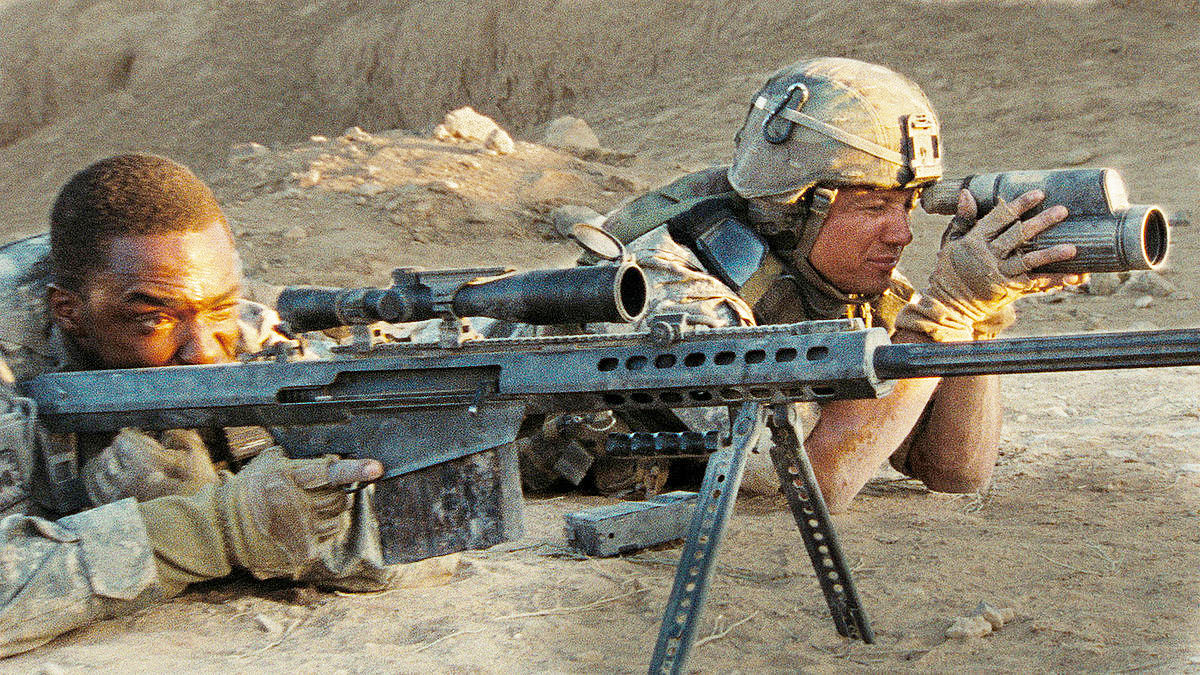
4. The Hurt Locker: Bombs away, and we’re not ok. Other than Modern Warfare 2 and Generation Kill, this immersive, nail-biting account of an IED team’s travails in the midst of the suck was the best pop culture simulator out there for feeling embedded in Iraq…and stuck at the wrong Baghdad street corner at just the wrong time. And with the tension ratcheting to uncomfortable levels in each of the ordnance disposal scenes, Kathryn Bigelow’s The Hurt Locker — sorry, King of the World — was the action movie of the year.

5. Coraline: In an auspicious year for both regular (see #10) and stop-motion (see #13) animation, Henry Selick’s adaptation of Neil Gaiman’s Coraline was the pick of the litter. It sorta got lost in the early-year shuffle, but Selick & Gaiman’s dark, twisted fairy tale delivered the goods, and hopefully it’ll find more life on DVD.
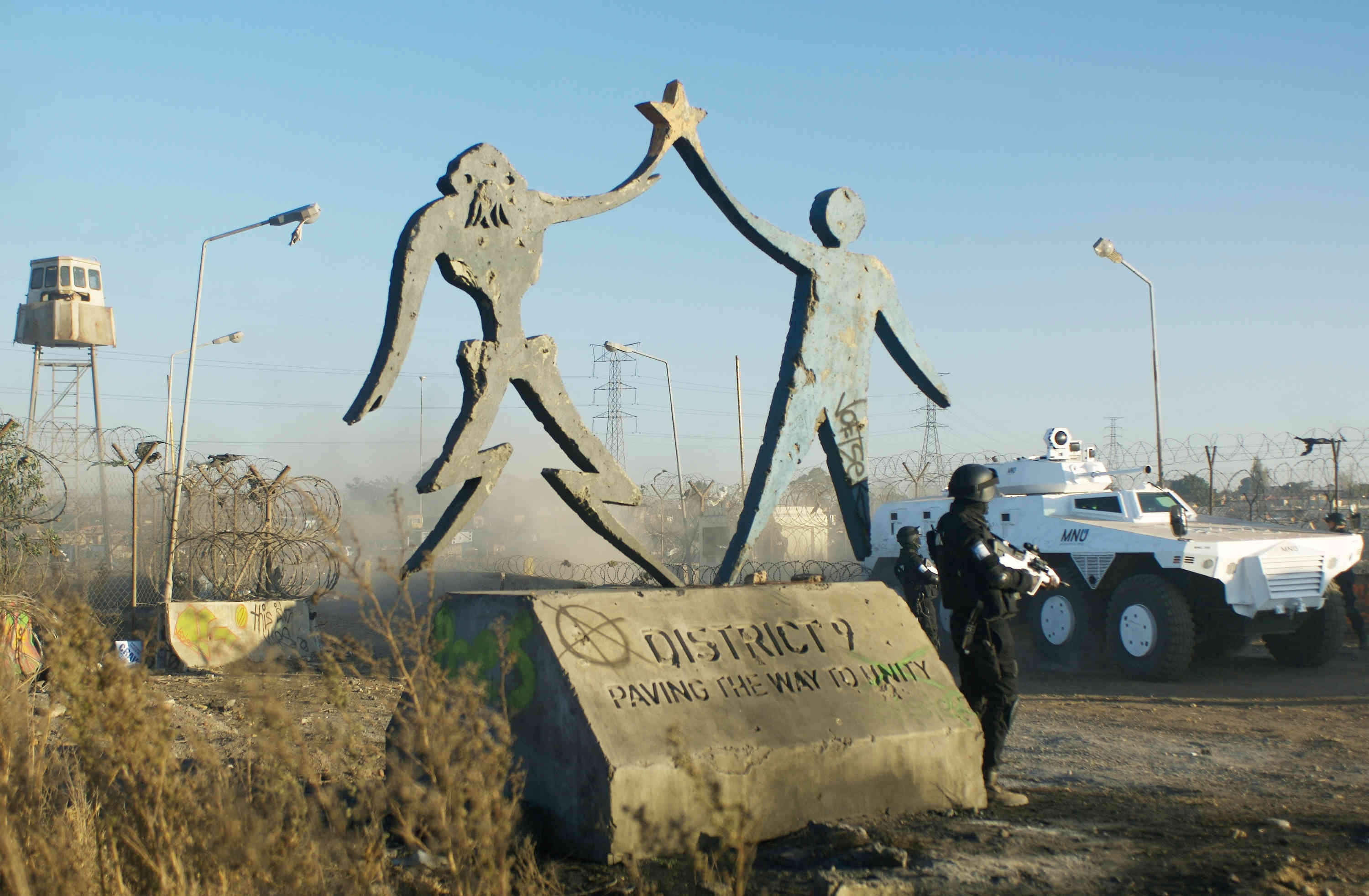
6. District 9: For those who find Moon a little too talky and slow, I direct you to Neil Blomkamp’s little (ok, $30 million) South African indie that could. Alien Nation meets Cry Freedom with healthy dollops of Cronenberg body horror and old-school Peter Jackson viscera-splatter, District 9 came out as more than the sum of its parts, and (with #8) was one of the most purely enjoyable films of the summer.
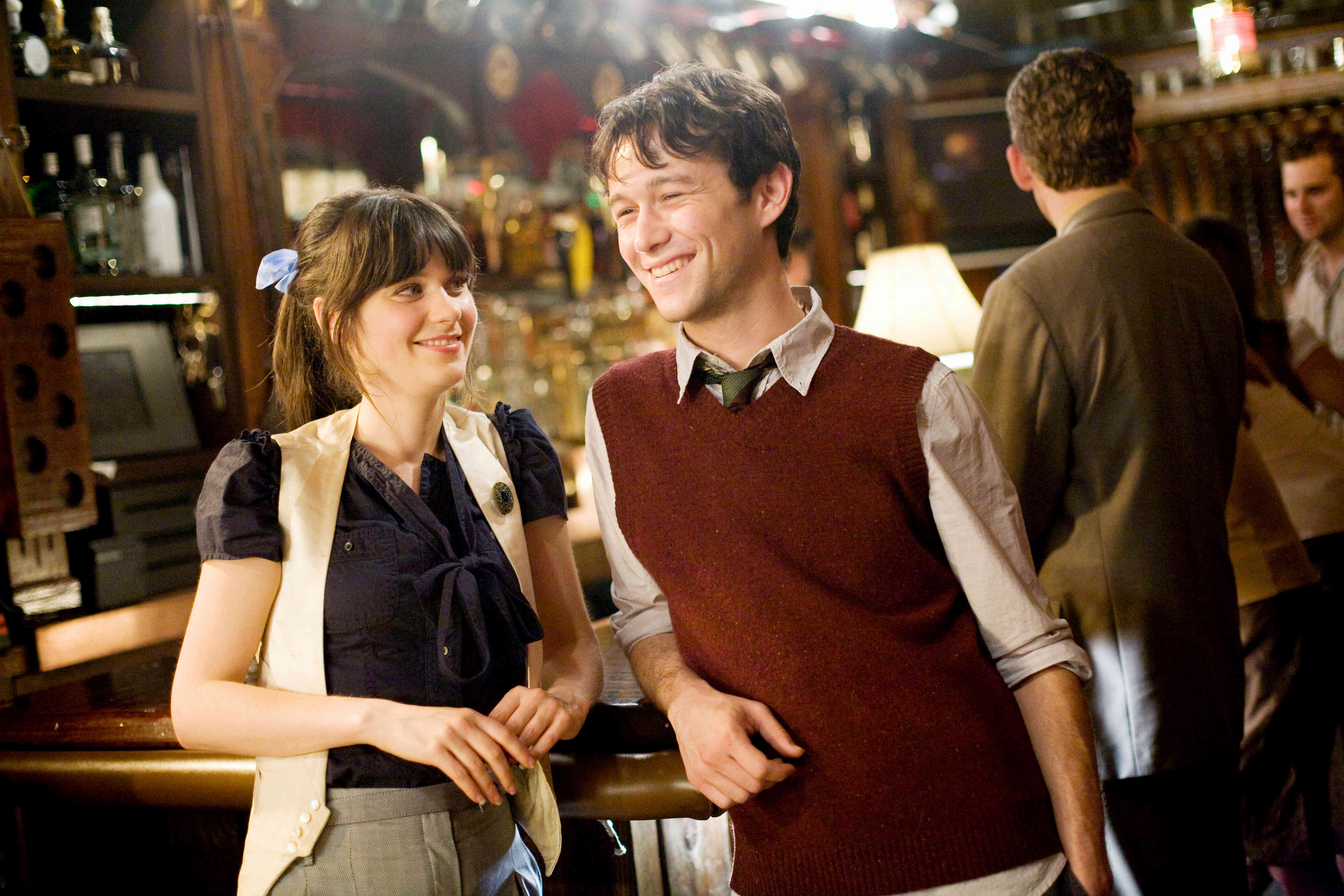
7. (500) Days of Summer: “This is a story of boy meets girl. The boy, Tom Hansen of Margate, New Jersey, grew up believing that he’d never truly be happy until the day he met The One. This belief stemmed from early exposure to sad British pop music and a total mis-reading of the movie ‘The Graduate’.” Speaking of said music, here’s a movie the early Elvis Costello would love. Sure, (500) Days is unabashedly for folks who’ve been on the wrong end of a break-up. But, even if it is ultimately Annie Hall-lite in a lot of ways, it had more truths to tell than most of the rom-coms out in any given year…combined.

8. Drag Me to Hell: Shaking off the Spidey 3 doldrums, Sam Raimi went back to his gross-out Evil Dead roots for this carnival concoction. Besides being easily the most explicitly anti-gypsy film since Borat, Drag Me to Hell was also, in its own way, as much of a Great Recession cautionary tale as Up in the Air. One hopes that when the Senate takes up financial services reform next year, our erstwhile reformers in that esteemed body will note what happened to Alison Lohman when she, against all better judgment, decided to do the bidding of the Banks.

9. Star Trek: There was admittedly a whole lotta stupid in J.J. Abrams’ Star Warsy revamp of the Star Trek franchise — Once exposed to the light, the movie’s basic premises completely fall apart. But, like the stomachache that accompanies eating too much candy, those regrets come later. In the moment, Star Trek was more fun than you can shake a stick at, and as solid and entertaining a franchise reboot as 2006’s Casino Royale. Let’s hope The Revenge of Khan or whatever it’s called turns out better than Quantum of Solace.
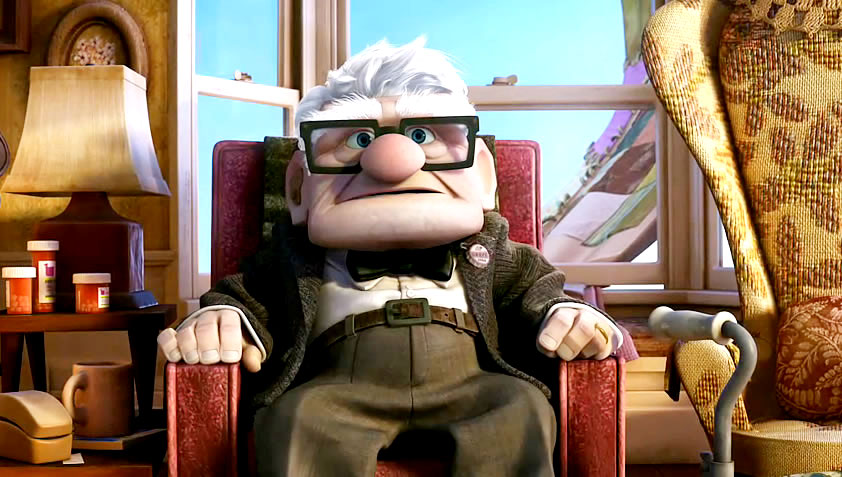
10. Up: If the movie were just the first ten-fifteen minutes, this might’ve been in the top five. But even more than WALL-E, the good stuff in Up is front-loaded. And, after the story of a lifetime ended a quarter hour in, I wasn’t much in the mood for talking dogs and big, funny birds (even birds named Kevin) anymore. Still, Pixar is Pixar, and Up carried their usual mark of quality.

11. The Damned United: Frost/Nixon for the futbol set, Tom Hooper’s ballad of Clough and Revie was a low-key character study that made up for an awkwardly-frontloaded bromance with another great performance by Michael Sheen and plenty of “Life in a Northern Town” local color to spare. You can practically smell the mud off the cleats in this one.

12. Duplicity: Perhaps I’m giving too many props to well-made breezy entertainments this year (see also Nos. 8 & 9). Nonetheless, Tony Gilroy’s Duplicity was a sleek espionage caper and a decently sexy love story that was all the more amusing because the stakes were so small. As it turns out, Clive Owen had just taken on evil corporations with a global reach a few weeks earlier in The International (a movie I caught on DVD, and which was most memorable for its Gunfight in the Guggenheim) — He’s more fun when he’s on the payroll.
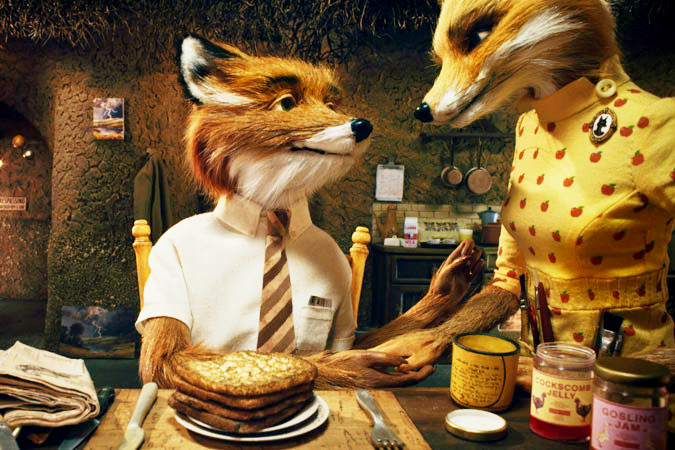
13. The Fantastic Mr. Fox: If you see one clever stop-motion adaptation of a sardonic children’s novel this year…well, see Coraline. Nonetheless, The Fantastic Mr. Fox was also one of the better entrants in the 2009 line-up. It was ultimately a little too Wes Anderson saccharine for my tastes, but, of course, your mileage may vary. And at least Fox didn’t wallow in the emo like, you know.
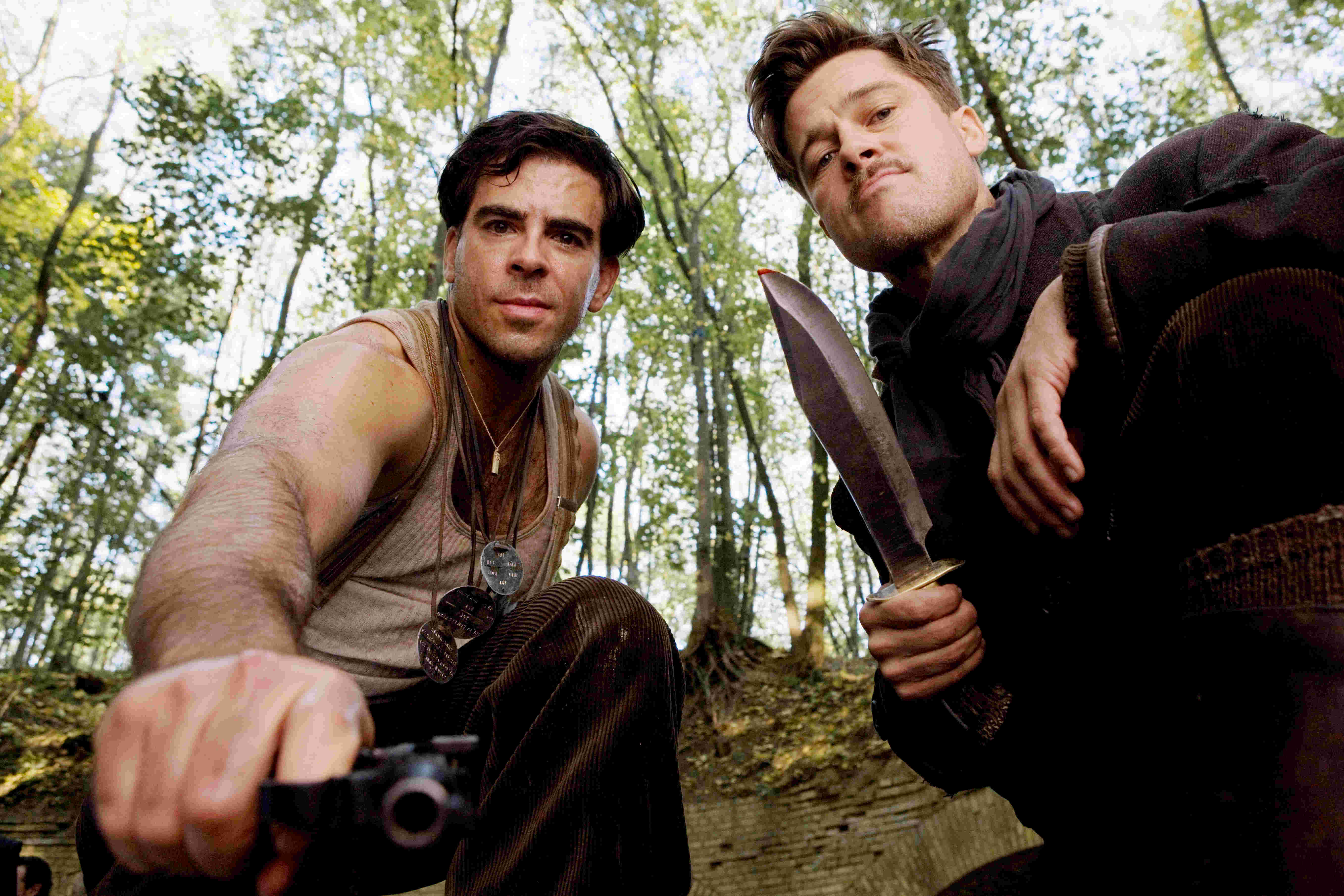
14. Inglourious Basterds: After a decade of languishing in the shallows, Quentin Tarantino found a bit of his old magic in this sprawling alternate history of WWII. Yes, it needed a good and ruthless editor, and some rather longish scenes don’t really work at all (I’m thinking mainly of Shoshanna’s lunch with Goebbels and Linda.) But at certain times — the basement cafe snafu, for example, or the memorable finale — Basterds is the best thing QT has done since Jackie Brown. Let’s hope he stays in form.
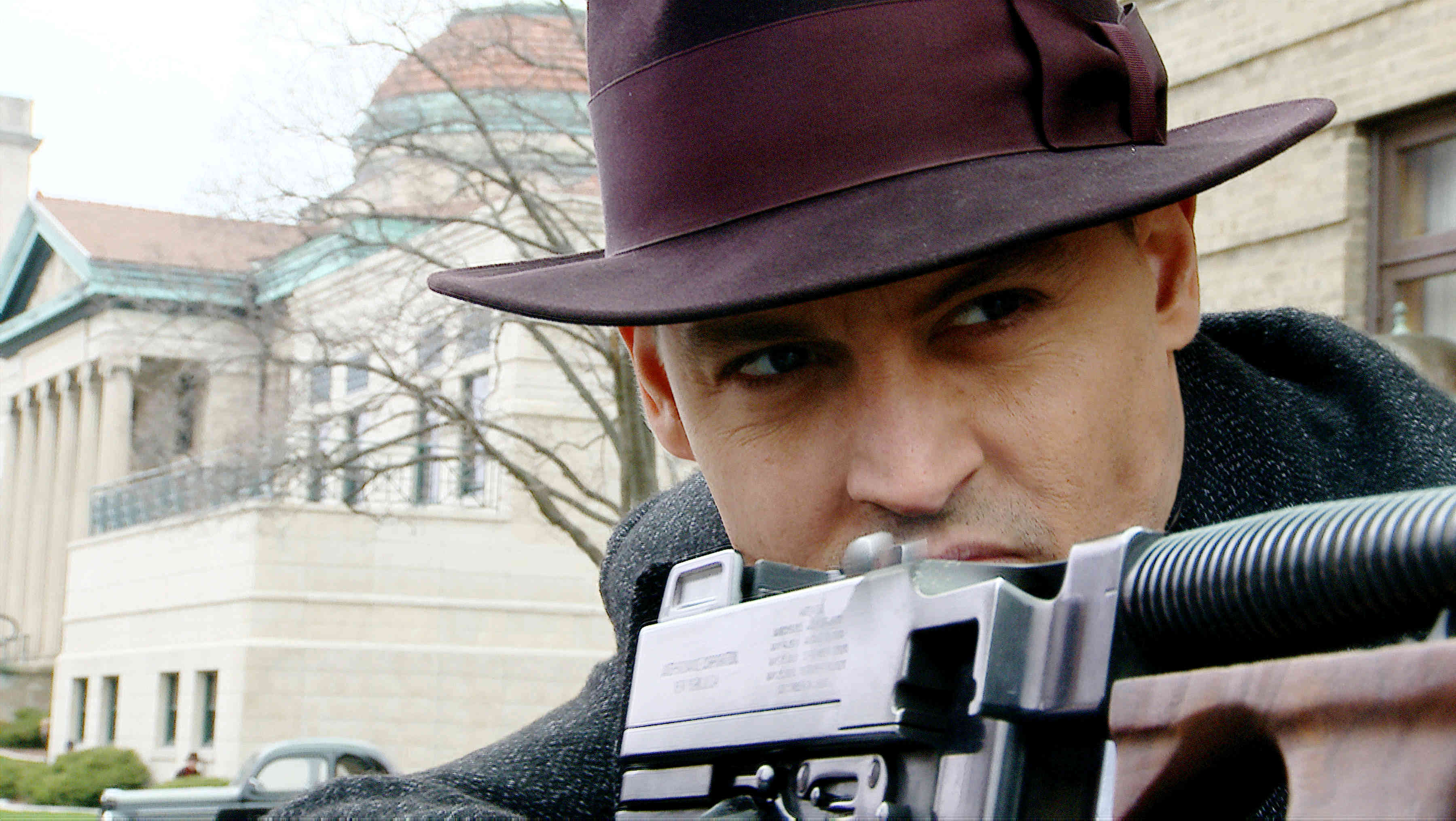
15. Public Enemies: Michael Mann’s high-def retelling of The Last Days of Dillinger was a strange one, alright. Like Basterds, it was long and languid and sometimes seemed to move without purpose. But, like Mann’s last grainy-digital foray into tales of manly men and the women they love, Miami Vice, Public Enemies has stuck with me ever since. Say what you will about the hi-def video aesthetic, it somehow seems to match Mann’s haunted, Hemingwayesque sense of poetry.
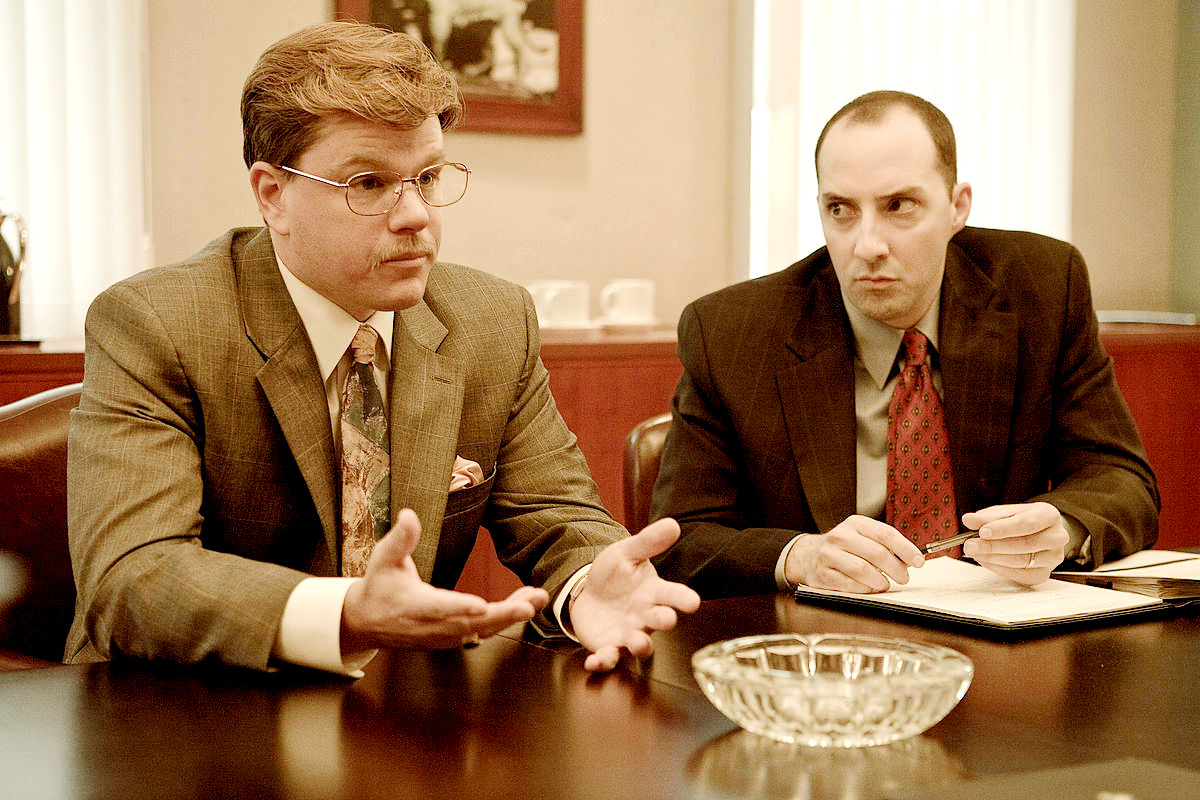
16. The Informant!: The tragedy of The Insider retold as farce, The Informant!, like many of Steven Soderbergh’s films, was experimental in a lot of ways. Some things worked (the ADM-buttery sheen); Others didn’t (the distractingly peppy Hamlisch score); Others still were hit-or-miss (the in-head bipolar voiceover). Nonetheless, The Informant! is mostly a success, and it’s good to see Soderbergh out there trying new things — I wish I’d gotten around to catching The Girlfriend Experience. (Ahem, the movie, that is. Sheesh, some people.)
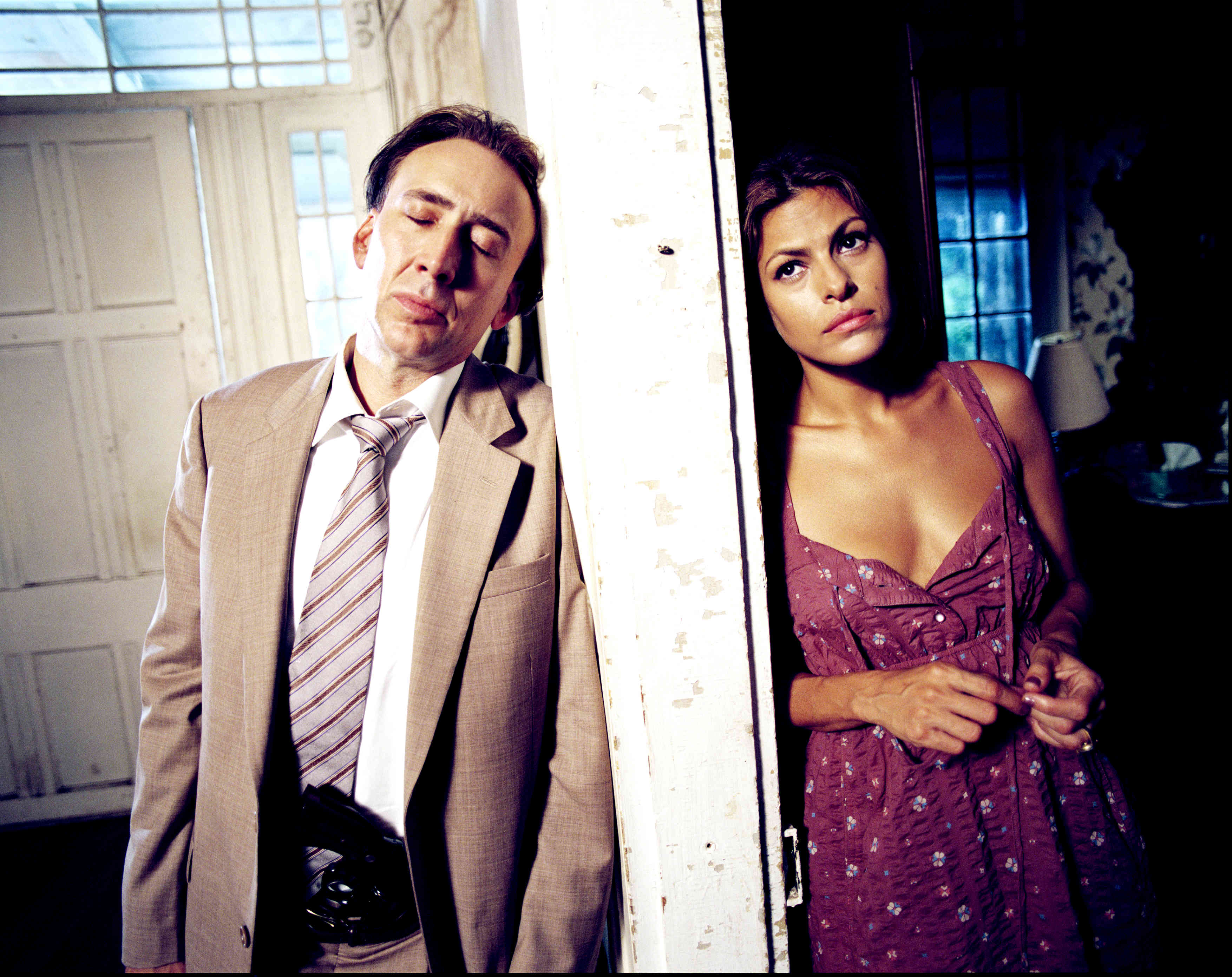
17. Bad Lieutenant: Port of Call New Orleans: I had definite doubts going in, but Werner Herzog’s Grand Theft Auto: New Orleans turned out to be a surprisingly fun gonzo trip. After years of hanging with the Kinski, good ole Werner sure knows his way around the crazy, and by pairing Nicholas Cage on a savage burn with hyperreal iguanas, voodoo breakdancers, and the like, he’s done Abel Ferrara’s Gloomy Gus version of this tale one better. There’s no Catholic angst for this Lieutenant — just reveling in sordidness…but then again, isn’t that the whole point of Carnival?
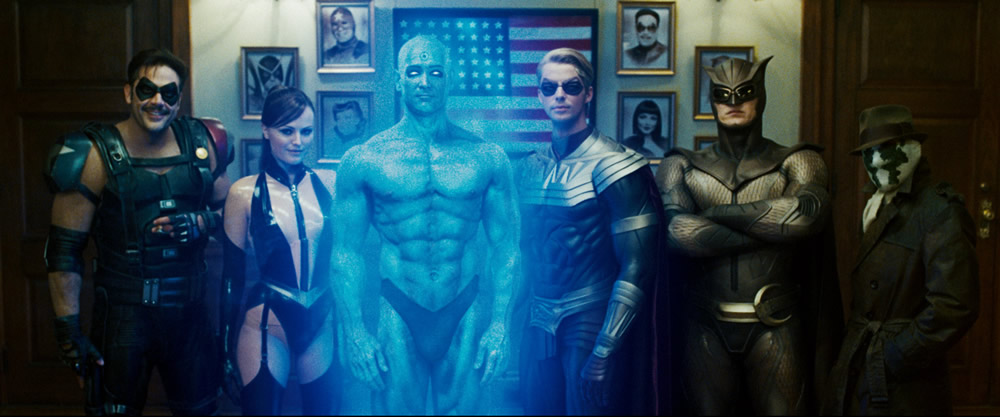
18. Watchmen: “At midnight, all the agents and the superhuman crews go and round up everyone who knows more than they do.” True, Zack Snyder’s attempt to recreate the Alan Moore graphic novel on film is flawed in a lot of ways. (The longer DVD version smooths out some of these issues while introducing others.) And I still wish the project had stayed in Paul Greengrass’ hands. But, give credit where it’s due — For all its many problems (most notably the fratboy-indulgences into “cool” violence), Snyder’s Watchmen got a lot of things right, from Dr. Manhattan sulking on Mars to Jackie Earle Haley’s turn as Rorschach. Snyder couldn’t match the degree of difficulty involved in the end, but Watchmen was still a worthy attempt.
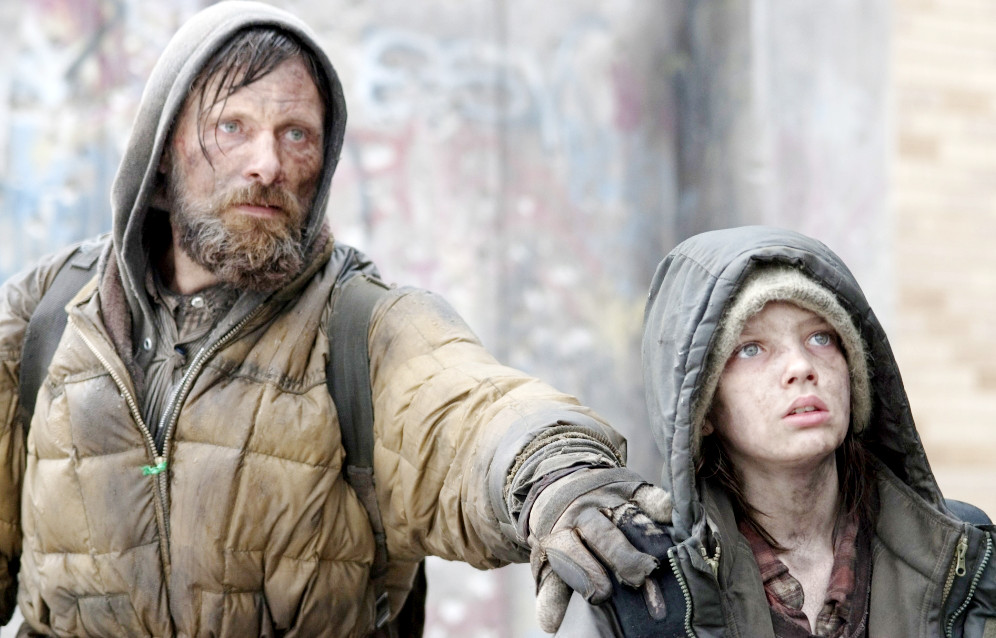
19. The Road: In the Future, There Will Be Cannibals: John Hillcoat’s film version of Cormac McCarthy’s dabbling in the apocalyptic form definitely captured the resonances of the book. And this is a quality production through and through, with solid performances by Viggo, the kid, Charlize Theron, and all of the HBO All-Stars (with particularly big ups to Robert Duvall.) Unfortunately, I didn’t think much of the book either, and in its monochromatic grimness, The Road never seems as memorable as Hillcoat’s earlier film, The Proposition. All work and no play makes Hobo Viggo somethin’ somethin’.
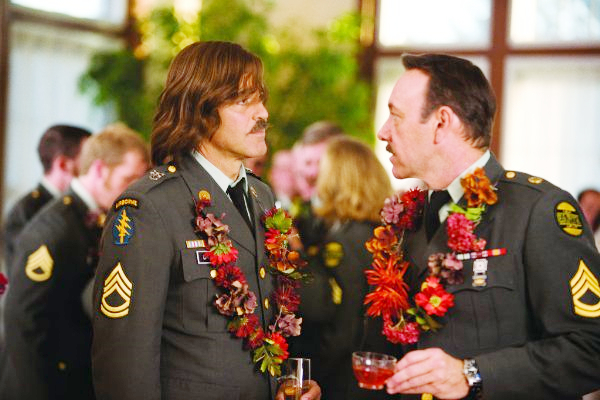
20. The Men Who Stare at Goats: I’m sure a lot of lists would’ve found room for Avatar or Up in the Air in their top twenty, and both have their merits (even if Avatar‘s are almost completely technical.) But if Avatar was too flat and Air too glib, The Men Who Stare at Goats was a frothy excursion that delivered on basically the terms it promised at the onset. Ok, there’s not much there there, but sometimes a couple of likable actors having an extended goof will go farther than Big, Oscar-Worthy Messages and World-Beating Tech. Hmmm, if you think about it, the “sparkly eye” technique probably would’ve gone over better with the Na’vi than all those Aliens-loaned cargo-loaders anyway. Score one for the First Earth Battalion.
Most Disappointing: Where the Wild Things Are, Terminator: Salvation
Worth a Rental: An Education, Avatar, Cold Souls, Eden (2006), Harry Potter and the Half-Blood Prince, The International, Paranormal Activity, Sherlock Holmes, A Single Man, Taken, Up in the Air, Zombieland
Don’t Bother: 2012, The Box, The Brothers Bloom, Extract, A Girl Cut in Two (2006), The Hangover, Invictus, Jennifer’s Body, State of Play, The Tiger’s Tail (2006), Whip It, World’s Greatest Dad
Best Actor: Sam Rockwell, Moon; Jeremy Renner, The Hurt Locker
Best Actress: Carey Mulligan, An Education
Best Supporting Actor: Christoph Waltz, Inglourious Basterds; Robert Duvall, The Road
Best Supporting Actress: Marion Cotillard, Public Enemies; Melanie Laurent, Inglourious Basterds
Unseen: 9, Nine, Adventureland, Angels & Demons, Amelia, Antichrist, Armored, Astro Boy, Black Dynamite, Blood: The Last Vampire, Bright Star, Brothers, Bruno, Capitalism: A Love Story, Cirque du Freak: The Vampire’s Assistant, Crank: High Voltage, Crossing Over, Everybody’s Fine, Funny People, Gentlemen Broncos, GI Joe, The Girlfriend Experience, Good Hair, The Education of Charlie Banks, The Great Buck Howard, Hunger, The Imaginarium of Doctor Parnassus, The Invention of Lying, It’s Complicated, Julie & Julia, Land of the Lost, The Limits of Control, , The Lovely Bones, I Love You Man, Me and Orson Welles, The Messenger, New York I Love You, Notorious, Observe & Report, Orphan, Pandorum, Pirate Radio, Ponyo, Precious, The Private Lives of Pippa Lee, The Proposal, Push, The Soloist, Surrogates, The Taking of Pelham1-2-3, Taking Woodstock, Thirst, The Time Traveler’s Wife, Transformers: Revenge of the Fallen, The Twilight Saga: New Moon, Two Lovers, The Ugly Truth, Whatever Works, X-Men Origins: Wolverine, Year One
2010: Alice in Wonderland, All Good Things, The American, The A-Team, The Book of Eli, Brooklyn’s Finest, Clash of the Titans, A Couple of Dicks, Daybreakers, The Expendables, Greenberg, The Green Hornet, Green Zone, Harry Potter and the Deathly Hallows Pt. 1, I Love You Phillip Morris, Inception, Iron Man 2, Jonah Hex, Kick-Ass, Knight & Day, The Last Airbender, Legion, The Losers, Percy Jackson & The Olympians: The Lightning Thief, Morning Glory, Predators, Prince of Persia: The Sands of Time, Red, Robin Hood, Salt, Season of the Witch, Shanghai, Shutter Island, The Sorcerer’s Apprentice, Toy Story 3, The Voyage of the Dawn Treader, Wall Street 2: Money Never Sleeps, The Wolf Man, Youth in Revolt, more needless ’80s remakes than you can shake a stick at. (Footloose, The Karate Kid, A Nightmare on Elm Street, Red Dawn), and…

TRON 2. 2010, y’all. It’s the future, and no mistake.
Hello all. Before I head out to pick up a rental car and drive down to the family compound for the holiday, here’s part 2 of the top 100 list for your enjoyment. In case you missed the beginning of the party, read this entry first. And if you’re all caught up to speed, let’s get back to it:
[The Rest of the List: 100-76 | 75-51 | 50-26 | 25-11 | 10-1]
[2000/2001/2002/2003/2004/2005/2006/2007/2008/2009]
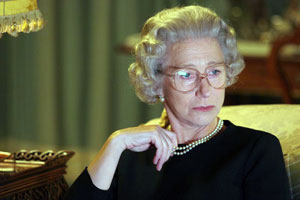
| From the original review: “Less a paean to ‘the people’s princess’ than a sharp-witted rumination on changing social values and the effect of global ‘Oprahization’ on contemporary politics, The Queen is an intelligent, discerning and enjoyable slice-of-life that’s well worth catching.“
From the year-end list: “A movie I shied away from when it first came out, The Queen is a canny look at contemporary politics anchored by Helen Mirren’s sterling performance as the fastidious, reserved, and ever-so-slightly downcast monarch in question…[It’s] the type of movie I wish we saw more often: a small, tightly focused film about a very specific moment in recent history.“ |
Unfortunately, this movie came out in 2006, so we don’t get to see Elizabeth II here with her Wii (and a gold-plated one at that.) That aside, Peter Morgan, Stephen Frears, Michael Sheen, and particularly Helen Mirren made The Queen a memorable and multi-faceted disquisition on changing social mores and their respective political impact on the residents of Buckingham Palace and 10 Downing St. Morgan and Sheen would continue to expose the real stories behind various famous television interviews throughout the rest of the decade, in 2008’s Frost/Nixon and 2009’s The Damned United. All three are worthwhile films, but The Queen is probably the best of the lot.

Boy, that escalated quickly…I didn’t quote from the original review on this one, because, basically, I whiffed it. I originally saw Anchorman one afternoon in the summer of 2004, soon after a recent dumping, and I clearly wasn’t in the mood for it — Funny is a fragile thing.
That being said, catching it on cable a few years later when not in Debbie Downer mode, Anchorman really came into its own for me. Basically, it’s a movie that will try just about anything to make you laugh, and you have to sorta admire its ambition to leave no joke untried. While I know Talladega Nights has its defenders, this eventually ended up being my favorite Will Ferrell movie of the decade. What can I say? 60% of the time, it works every time.

| From the original review: “Anyone who’s ever thrown in The Joshua Tree — that’s millions of people, obviously — and listened to the thrilling opening strands of “Where the Streets Have No Name” can probably imagine the potential of U2 filtered through an IMAX sound system and projected in multiple dimensions. All I can say, it’s pretty darned cool…U2 3D really feels like the future in concert films. As a music experience, it’s better than having the best seats in the house (and the drunk girl on her boyfriend’s shoulders in front of you — while in 3D — never actually obscures your vision.“
From the year-end list: “U2 3D was both a decently rousing concert performance by Dublin’s fab four, and — more importantly — an experimental film which played with an entirely new cinema syntax. Just as students look back on D.W. Griffith films of a century ago as the beginnings of 2D-movie expression, so too might future generations look at this lowly U2 concert and see, in its layering of unrelated images onto one field of vision, when the language of 3D really began to take off. At which point someone might also say, ‘Man, I wish they’d played ‘So Cruel’ instead of some of these tired old dogs.’“ |
Of course, your enjoyment of this concert film will depend a great deal on how much you like U2 — For my part, they’re not in my personal top tier, but I’ve always had a solid appreciation for them. Nonetheless, as I said above, U23D — even more than the beautiful but ultimately pretty conventional Avatar — still feels like a significant step forward for the art of movie-making. It’s the only film I’ve ever seen that uses 3D-technology as a new visual language rather than just a gimmick. And, rather than another umpteen variations on “OMG that arrow is coming right at me!“, I’d really like to see more filmmakers play with the 3D syntax tested out here in the decade to come.
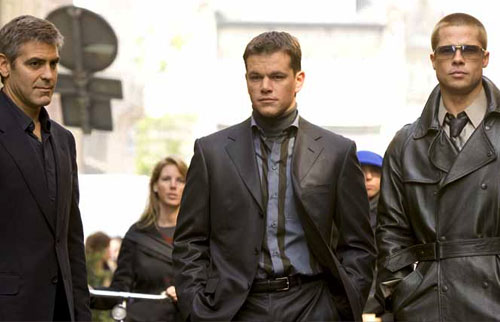
| From the original review: “Nonsensical, self-indulgent, and occasionally even a tad smarmy, Steven Soderbergh’s much-hyped Ocean’s Twelve is also, I’m happy to report, just plain fun…Twelve turned out to be what Soderbergh tried and failed to do with Full Frontal…As much a riff on stars and stardom as the heist movie we were all expecting, it’s probably the most sheerly pleasurable film experience you’re going to find this side of The Incredibles.“
From the year-end list: “Two swollen hours of Soderberghian glamour and inside baseball. Not everyone’s cup of tea, I know, but I found it an agreeable improvement on Ocean’s 11.“ |
I’m betting this will be another contested choice, as I’ve even seen Ocean’s Twelve on a few worst-of-decade lists. But while the other two Ocean films are basically just standard-issue heist flicks, I thought this one aimed a little more outside the box, instead trying to amplify the “hanging with the Rat Pack” aspect of the original 1960 film. In short, I just love the sprawling movie metaness of Ocean’s 12: the characters talking about Miller’s Crossing; Topher Grace “totally phoning in that Dennis Quaid movie“; Eddie Izzard’s cliched hot secretary; the gymnast getting lost in the luggage. And, yes, the Julia Roberts-Bruce Willis bit.
Sorta like Grant Heslov’s The Men Who Stare at Goats, Ocean’s 12 just feels like a Hollywood lark, one in which the ultra-glamorous movie stars in tow have kindly allowed us to come along for the ride, maybe play a few hands. I guess a lot of people didn’t vibe into Twelve like I did, but I found its jaunty, devil-may-care sense of fun contagious.

| From the original review: “I went in expecting not much more than an over-the-top ‘message movie’ schmaltzfest, or at best a harmless helping of mediocre, inert Oscar Bait like Cinderella Man or A Beautiful Mind. But [Elah] turned out to be quite a bit better than I expected…[It’s] a melancholy rumination on the hidden casualties of (any) war and a somber inquiry into the heavy toll exacted on the wives, parents, and children of military men…And, biblical parallels aside, the film showcases the best work Tommy Lee Jones has done in years.“
From the year-end list: “Paul Haggis’ surprisingly unsentimentalized depiction of the hidden costs of war for the homefront, Elah benefits greatly from Tommy Lee Jones’ slow burn as a military father who’s lost his last son to a horrific murder…There was something quintessentially America-in-2007 about Jones this year. In every crease and furrow of this grizzled Texan’s visage, we can see the wounds and weariness of recent times, the mask of dignity and good humor beginning to slip in the face of tragic events and colossal stupidity.“ |
In the Valley of Elah wasn’t the best TLJ movie of 2007 — that’ll come later — but, surprisingly given Paul Haggis’ involvement, it was a darned good one. Looking back, the key, I think, was that everyone here from Jones to Susan Sarandon, Charlize Theron, Jason Patric, and Josh Brolin in supporting roles underplayed the material, so that only a few in-your-face Haggisian elements rankle — that bizarre and plot-convenient van technician, for example, or the perhaps too-on-the-nose final shot of the movie. Otherwise, though, Elah cut deeper for staying free of the bombast that marked Paul Haggis’ overwrought Crash, and it boasted arguably the best performance of 2007.
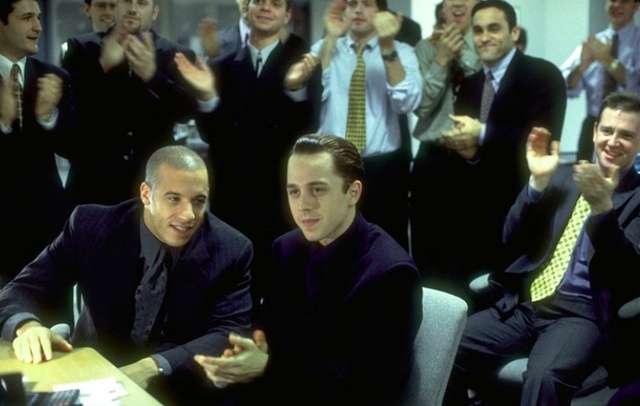
| From the year-end list: “Surprisingly good, not the least because of the charismatic Vin Diesel, Glengarry Glen Affleck, and the great Wall Street scene.“ |
Wall Street for the DVD generation, Ben Younger’s Boiler Room was another nice surprise. Ok, some of the father-son stuff with Giovanni Ribisi and Ron Rifkin is pretty well overcooked. But, as with Ocean’s 12, I like the meta-ness involved here. The fact that all these chop shop Jersey Boys constantly and lovingly quote Wall Street and Glengarry Glen Ross throughout made the movie seem that much more realistic. And Boiler Room resonates tellingly in the details, like newly-minted millionaire Ben Affleck owning nothing but a McMansion, a giant TV, and a tanning bed. It’s basically a B-movie, sure, but it’s a much better one than you’d ever expect going in.

| From the original review: “If you’ve seen the ads, you probably already know whether or not this film will appeal to you: You’re either going to find it hilarious or repellent (or probably both). I was sickened and disgusted, and there were times I was laughing so hard that Berkeley thought there was something wrong with me…Alligator Tightrope may just be the dumbest, most nightmarish and cringe-funny thing I’ve seen all year.“ |
If you’ve been reading this list carefully, you may have noticed that I telegraphed this potentially contentious pick back with Borat at #97 (as well as with my caveat about Z-grade comedies in the original intro.) And all I can say is, s/he with the straight face cast the first stone. I know Jackass is barely a movie at all – it’s television on a movie screen, and depraved, zero-budget television at that. It has little-to-no redeeming social value, it spawned a lot of worthless and sub-moronic imitations, and, in fact, it’s mostly just ninety minutes of charismatic lunatics doing patently stupid things. But, lord help me, it is really, really funny at times.
I never saw the 2006 follow-up, so that one might’ve been even more hilarious or the well might’ve run dry by then. Nonetheless, the original Jackass had the uncanny ability to bypass all higher-order thought processes and send my reptile brain into giggling fits. It’s like a shiny toy car, plunged straight into the comedy id.

| From the year-end list: “A heart-warming romantic comedy about a boy, a girl, and the spankings that brought them together…A lot of the people I’ve spoken with had trouble with the ending, but I thought that it ended the only way it really could…any other way would’ve given the audience the out they wanted to condemn these people as sideshow freaks. By treating this bizarre couple as just another relationship in a weird wide world, Secretary offers a portrait of two people ‘just right’ for each other that is much more touching than the average, vanilla romantic comedy.“ |
So, while I’m getting the sick-and-twisted choices out of the way, can I get a word in for Steven Shainberg’s Secretary? Based on the Mary Gaitskill short story and the film that made Maggie Gyllenhaal a star, Secretary was in essence an attempt to test the boundaries of the rom-com format by seeing if it could accommodate a little BDSM kink. In fact, however naughty-minded at times, Secretary is actually pretty standard fare: Get past the cuffs and such, and what we here is a meet-cute between two people who are surprisingly perfect for each other, some not-insurmountable romantic turmoil along the way, and eventually a marriage and a happy ending — It’s like J. Lo’s The Wedding Planner or Maid in Manhattan, if J. Lo was still wearing her S&M get-ups from The Cell. (Now that I think about it, Secretary may not even be all that outside-the-norm. Let’s remember 1990’s Pretty Woman, a movie oddly considered romantic by tons of aficionados of the genre, is basically the story of Richard Gere up and buying himself a hooker.)
True, James Spader had already played a bizarro-perv way too often to be taken seriously here. And, in fact, you can see him slowly, inexorably turning into the Brundlefly version of William Shatner he would eventually become as the movie grinds along. Still, as far as rom-coms go, I thought Secretary went down more easily than most. Say what you will about the bondage on display here — I’d argue there are dozens of rom-coms out each year — say How to Lose a Guy in 10 Days or The Ugly Truth, to name just two — that are the real cruel and unusual punishment.
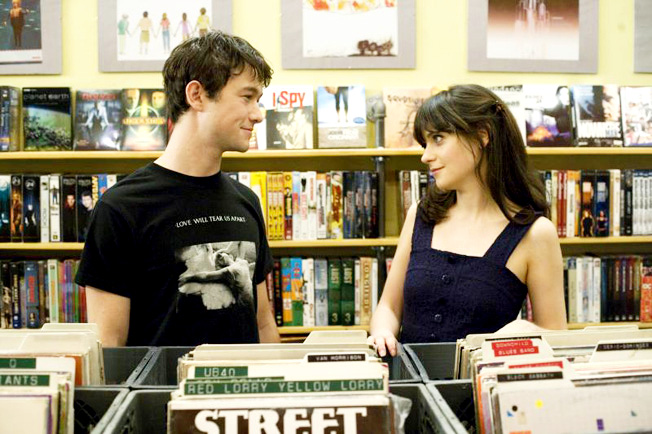
| From the original review: “This won’t be a film for everyone — It’s often too cute or clever by half, and I’ll concede that it probably reeks of forced Little Miss Sunshine or Juno-style indie cachet to people who don’t roll with it…For me this definitely goes on the Garden State ‘vaguely-guilty pleasure’ pile…It’d be hard to sum up (500) Days better or more succinctly than the tagline: ‘Boy meets girl. Boy falls in love. Girl doesn’t.’ If this has ever happened to you, and lordy has it happened to me, I suspect you’ll enjoy [it] quite a bit as well.“
From the year-end list: “Speaking of sad British pop music, here’s a movie the early Elvis Costello would love. Sure, (500) Days is unabashedly for folks who’ve been on the wrong end of a break-up. But, even if it is ultimately Annie Hall-lite in a lot of ways, it had more truths to tell than most of the rom-coms out in any given year…combined.“ |
Rough winds do shake the darling buds of May, and Summer’s lease hath all too short a date…500 days, in fact. But, hey, at least we’ll always have the memories. Despite the way it was sold, (500) Days of Summer is barely a love story at all, nor is it a dissection of how a particular romance — that of Tom (Joseph Gordon-Leavitt) and Summer (Zooey Deschanel) goes sour. It’s more about how Tom is, despite himself, driven to romance in the first place (Hint: It’s Morrissey’s fault), and about how the desire to be in love can sometimes be mistakenly substituted for the real thing.
If that sounds a bit heavy, well, it’s not — (500) Days also includes a musical number, a Han Solo cameo, lots of goofy shenanigans involving Geoffrey Arend (a.k.a. Mr. Christina Hendricks)…in short, there’s a lot of sugar to help soothe all the break-up angst here. I doubt (500) Days makes for a very good date movie in the end, but it’s a good one to cue up if and when that date goes south. (And since all early word seems to indicate that Matthew Vaughn’s Kick-Ass will make a star of Chloe Moretz in 2010, let’s remember she did the preternaturally mature pre-teen schtick here first.)
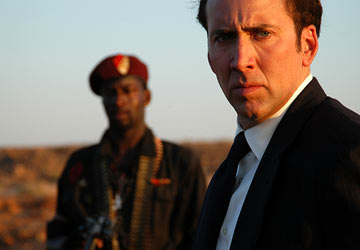
| From the original review: “At once a character study of an amoral arms dealer, a bitter tirade againt third world exploitation, and a dark comedy that may run too sour for some tastes, Lord of War is an above-average entrant in the satirical muckraking tradition. And its occasional preachiness is leavened by Nicolas Cage’s consistently-amusing and deftly-written performance, most of which is voiceover, at the center of the film.“
From the year-end list: “Anchored by Nicholas Cage’s wry voiceover, Andrew Niccol’s sardonic expose of the arms trade was the funniest of this year’s global message films (That is, if you like ’em served up cold.)“ |
Lord of War is one of those movies that’s moved up in my estimation over the years, partly because later attempts at political satire, such as Jason Reitman’s Thank You for Smoking, couldn’t ever seem to find the delicate balance of this mordant and spirited tirade against the arms industry. There are some excellent performances here from the likes of Ian Holm and Eamonn Walker, but in the end this is Nic Cage’s show, and, as with this year’s Bad Lieutenant: Port of Call New Orleans, this film shows how good he can be when he’s not just working for a paycheck. And like The Wire, Andrew Niccol’s Lord of War is both very angry and very funny: Its sensitivity to obvious injustices in the world — “Thank God there are still legal ways to exploit developing countries” — fuels its dark brand of humor, and vice versa.
Speaking of which, Spike Lee’s overlooked and much-maligned Bamboozled works very similarly to Lord of War in its anger-to-humor quotient, and it is, possibly up until its last act, a very funny satire. (It also makes for a great double-feature with Kevin Wilmott’s alternate history mockumentary CSA: The Confederate States of America, which Lee executive-produced.)
Most obviously, Bamboozled sheds a harsh light on aspects of America’s pop-culture past that we still remain eerily silent about. But it’s also a ruthless, equal-opportunity lampooner, calling out Michael Rappaport’s white-boy sports fan (“I’m blacker than you, brother-man!“) as mercilessly as Mos-Def’s crew of would-be gangsta rappers, the Mau-Maus. (There’s a devastating joke at the end of the movie involving the cops and “1/16th” (a.k.a. MC Serch of 3rd Bass), the “light-skinned” member of the Mau Maus: Everybody else gets shot, he — despite his best attempts — can only get arrested.)
Not even the main character, Damon Wayans’ Pierre Delacroix, is safe from Lee’s scouring here. A guy who for all intent and purposes lives his life in “whiteface,” DeLa eventually gets his comeuppance from his dad, in a choice cameo by Paul Mooney. (“Boy, where the f**k did you get that accent?”) More than just call out the old embarrassing traditions of blackface and minstrelsy, Bamboozled casts blame all around. It very plausibly suggests how blackface notions have remained alive in recent decades (Good Times, anyone?), while noting the artistry of the performers so often forced into such lowly affairs (in this case, Savion Glover, Tommy Davidson, and the Roots, who put on a good show despite the sordidness of it all.) Sure, Bamboozled gets a bit lost in the weeds in its final moments, but a lot of satires have a tendency to ride off the rails in the last act. Until then, Bamboozled will make you angry, it will make you laugh, and it will make you think.
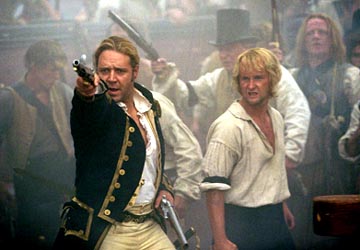
| From the original review: “Like pretty much all of Weir’s other films, Commander is an extremely competent piece of work, in some ways even masterful…[T]he historical details seemed right to my landlubber’s eye, and I thought the languid, episodic pacing of the film…helped to convey the rhythm of life at sea in the Napoleonic era…kudos go out to Peter Weir & crew for making a picture as engrossing and transporting as this one.“
From the year-end list: “It’s a long title, it’s a long movie. But a good kinda long…in fact, as I said in my initial review, it seemed to move to the langorous rhythms of a long sea voyage, one that I may not take again for awhile, but one that I still thoroughly enjoyed. And I’ll say this for Russell Crowe…somewhere along the way in each of his films, I tend to forget that he’s Russell Crowe. His Capt. Jack Aubrey was no exception.“ |
I haven’t watched Master and Commander since it first set sail in 2003, and I have a feeling I should probably give it another go. The movie seems to have floated to the higher echelons of a lot of other Best-of-Decade lists and, If nothing else, Weir’s film made for the other quality Star Trek reboot we saw this decade. In fact, particularly given how sequel-crazed Hollywood tends to be these days, I’m sorta surprised we never saw any of the other Patrick O’Brien seafaring novels made into movies after this film, even if they had to recast Crowe and go with someone other than Weir to direct. (I assume Paul Bettany would still be game — the man did just make Legion, after all.) Who knows? Perhaps the studio suits got scared off by a Jonah somewhere along the line.
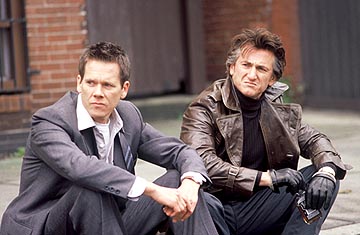
| From the original review: “[W]ith its crisp, no-nonsense direction and a glut of extraordinary performances…it pretty much has to be considered an Oscar contender…To paraphrase the son of an altogether different neighborhood, sometimes the world is a monster, bad to swallow you whole.“
From the year-end list: “The waters of the Charles are disturbed, something is rotten in the outskirts of Boston, and it’s safe to say the Fates are wicked pissed…Mystic River is inhabited and propelled by a spirit of lumbering, impending, inexorable doom…what Legolas might call a ‘sleepless malice.’ It is that existential malice, rooted so strongly in local color, that gives this River its considerable power.“ |
What with Scorsese’s The Departed and Affleck’s Gone Baby Gone, several crime sagas of the Oughts went to the Hub for their local color. (I guess the trend might’ve started with 1994’s Blown Away, although I’ve tried to willfully forget that movie.) In any case, Clint Eastwood’s Mystic River (like Gone, originally a novel by Dennis Lehane) was the best of the lot. There are some elements of the story that don’t really work on film — Kevin Bacon’s silent phone-stalker of an ex-wife, for example, or Laura Linney’s Lady Macbeth routine near the end of the film. Nonetheless, most of Mystic River is very worthwhile.
In retrospect, it would have been that much nicer to see Bill Murray win the Oscar that year for Lost in Translation, given that Sean Penn ended up winning again for Milk later on. But Penn, as with the rest of the cast, is very good here. (Consider the scene of him breaking down on his Dorchester porch, in front of Tim Robbins.) Hard times in Beantown, alright.
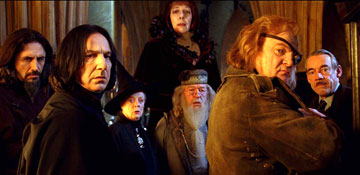
| From the original review: “Mike Newell’s dark and delectable Goblet is brimming over with energy and suspense, and, to my surprise, it’s probably the best Potter film so far. (And this is coming from someone who actually preferred Book III to Book IV on paper.)“
From the year-end list: “[G]ive Mike Newell credit: Harry’s foray into Voldemortish gloom and teenage angst was easily the most compelling Potter film so far. Extra points to Gryffindor for Brendan Gleeson’s more-than-slightly-bent Mad-Eye Moody, and to Slytherin for Ralph Fiennes’ serpentine cameo as He-Who-Must-Not-Be-Named.“ |
Beginning with 2001’s Harry Potter and the Sorcerer’s Stone, Young Mr. Potter had many filmed adventures over the course of this decade — six in all. And, while I know Alfonse Cuaron’s Prisoner of Azkhaban has its supporters, I thought this fourth installment by Mike Newell was the closest the movie series ever came to capturing the magic of the (first several) books.
We’ve moved pretty far afield here from the flat, colorful, and thoroughly boring Hogwarts of the Chris Columbus iterations — In Goblet, Dumbledore’s academy of magic possesses the menace and grandeur it was missing earlier on. Meanwhile, a lot of the original cast, most notably the kids, have found their groove by Act IV (as has Richard Harris’ replacement, Michael Gambon), and they pick up some key reinforcements in Brendan Gleeson, Ralph Fiennes, Clemence Poesy, and even the Doctor himself, David Tennant. Throw in the ironic pre-Thatcher haircuts, an early sighting of Twilight‘s Robert Pattinson for the fangirls, and our first real interaction with He Who Must Not Be Named, and Goblet had a little something for everybody.
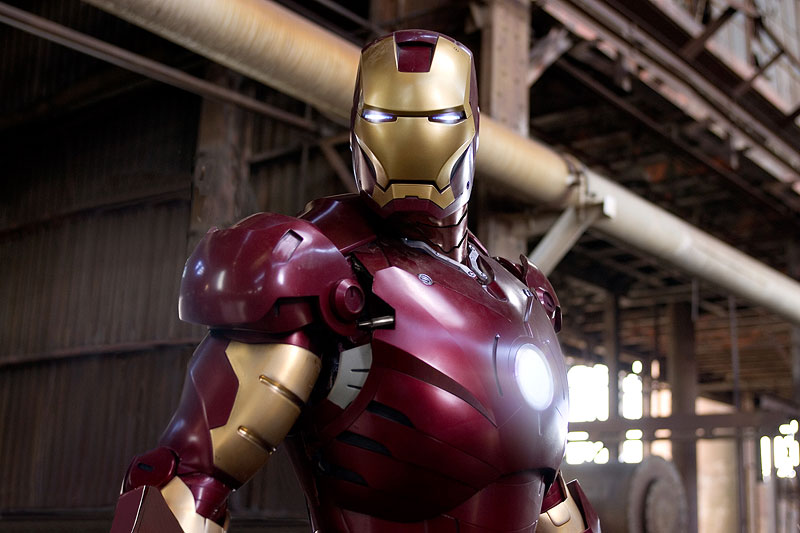
| From the original review: “[G]iven I have no real reservoir of nostalgia for its titular hero, Jon Favreau’s crisp, surprisingly fun Iron Man seems that much more of an achievement…As far as origin stories go, I’d say Iron Man can hold its helmet proudly alongside Batman Begins and the Donner Superman, thanks mainly to its superb cast (and inspired casting)…[I]f you allow for the constraints of the genre, Iron Man is basically everything you’d want in a summer-y superhero blockbuster.“
From the year-end list: “Much better than I ever anticipated, Jon Favreau’s (and Robert Downey Jr.’s) Iron Man kicked a summer of superheroes off in grand fashion. In the end, I preferred the gloomy stylings of Gotham in 2008, but there’s definitely something to be said for this rousing, upbeat entrant in the comic movie canon. It delivered on its own terms, and it was a much better tech-fetishizing, boys-and-their-toys type-film than, say, 2007’s Transformers or (I suspect) 2009’s GI Joe.“ |
“Heavy boots of lead fills his victims full of dread. Running as fast as they can, Iron Man lives again!” As, for that matter, does Robert Downey, Jr., who began his recent career reinvention as a box office A-lister (see also: Sherlock Holmes) with his turn here as alcoholic Marvel billionaire Tony Stark. Throw in a very enjoyable Jeff Bridges as the Big Bad and Jon Favreau keeping an admirably light touch in a summer of darkest knight, and you end up with a surprisingly fun comic book outing, one that largely sidestepped the “origin story” doldrums that mar a lot of films in the genre. Now, let’s hope Mickey Rourke, Sam Rockwell, and Scarlett Johansson can take Iron Club up a notch in this summer’s sequel.
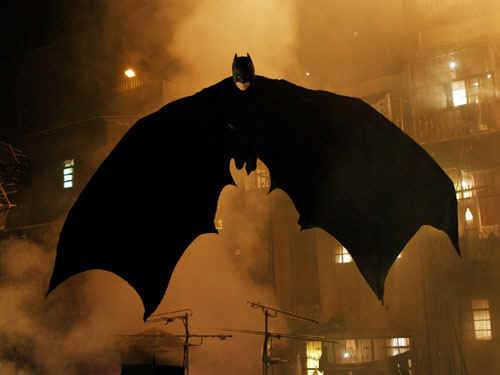
| From the original review: “I’m happy to report that, while Chris Nolan’s Batman Begins has some minor problems — each character gets a few clunky lines and the final action sequence isn’t all that memorable — this is the Batman movie that fans of the Dark Knight have been waiting for. There’s no Schumacher statuary in this Gotham City, and nary a Burtonesque Batdance to be had. Nope, this is just straight-up Frank Miller-style Batman, scaring the bejeezus out of the underworld in his inimitable fashion.“
From the year-end list: “The Dark Knight has returned. Yes, the samurai-filled first act ran a bit long and the third-act train derailing needed more oomph. Still, WB and DC’s reboot of the latter’s second biggest franchise was the Caped Crusader movie we’ve all been waiting for. With help from an A-list supporting cast…Chris Nolan and Christian Bale brought both Batman and Bruce Wayne to life as never before, and a Killing Joke-ish Batman 2 is now on the top of my want-to-see list.“ |
“Without warning, it comes, crashing through the window of your study…and mine…I have seen it before somewhere…it frightened me as a boy…frightened me…Yes, Father. I shall become a bat.” Speaking of the Dark Knight, 2005’s Batman Begins was another very solid “origin-story” comic book film, one that long-suffering fans of the Caped Crusader had waited for for a good long while. Yes, Begins has some problems — there’s probably too much “fear is the mindkiller“-type patter throughout, the elevated railcar climax is goofy, the villain’s plan makes no sense (people, after all, are bags of mostly water — they’d be blowing up right along with the sewer mains), and Batman’s farewell to Ras Al Ghul (“I won’t kill you, but I don’t have to save you“) is totally and utterly out of character. (I blame co-screenwriter David Goyer, who should’ve known better.)
All that being said, you finally got the sense here that Batman was in the hands of a director who just wanted to figure out what makes a ridiculously rich guy want to dress up like a bat and fight crime. (Tim Burton is a good director, and I’m particularly fond of Batman Returns. But while Returns is a great Tim Burton movie, it’s not a particularly good Batman flick, some of the Catwoman romance notwithstanding.) And if Nolan could get this close to capturing the spirit of Frank Miller’s Batman: Year One, it just made you wonder what he could do once he got his hands on The Killing Joke…
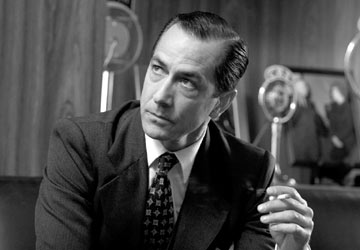
| From the original review: “While perhaps a bit too black-and-white in terms of the history, George Clooney’s Good Night, and Good Luck is nevertheless a somber and captivating paean to Edward R. Murrow, his televised expose of Joe McCarthy, and, by extension, the Pioneer Days of Television Journalism…[W]hat could have been an above-average History Channel documentary is instead a powerful and intelligent work of cinema that’s easily one of the better films out this year.“
From the year-end list: “A historical film that in other hands might have come off as dry, preachy edutainment, Good Night, and Good Luck instead seemed as fresh and relevant as the evening news…well, that is, if the news still functioned properly.“ |
Enemy sighted, Enemy met — I’m addressing the realpolitik: In a decade that saw television journalism continue to devolve into a morass of apple-cheeked automatons doling out substance-less blather, George Clooney’s Good Night, and Good Luck was both a refreshing tonic and a wistful remembrance of the days that were. Yes, folks, there was apparently a time when the Fourth Estate didn’t necessarily act like court stenographers for the people in power. Although, as the black and white cinematography would suggest, that time seems like a million miles from now.

| From the original review: “The head of the film, its first forty minutes or so, feels like a Paul Greengrass movie such as Bloody Sunday: a grim, gripping tale of social and political injustice…told in naturalistic, faux-documentary style. But the thorax of District 9 delves deeper into old-school David Cronenberg territory, with all the gooey orifices, transformational anxiety, and throbbing gristle that usually portends…And, by the time we get to the abdomen, we’re suddenly watching a George Miller or Jim Cameron-style actioner, with more than enough visceral excitement to keep the antennae twitching. All stitched together, District 9 is quite a remarkable feat of summer sensation.“
From the year-end list: “Neil Blomkamp’s little (ok, $30 million) [film was the] South African indie that could. Alien Nation meets Cry Freedom with healthy dollops of Cronenberg body horror and old-school Peter Jackson viscera-splatter, District 9 came out as more than the sum of its parts, and…was one of the most purely enjoyable films of the summer.“ |
Now that we’ve reached a stage where CGI can create pretty much anything, and for relatively cheap, it’s good to know we’ll still sometimes get unique and original sci-fi movies like District 9, in between the extended toy commercials and sequels based on board games. Neil Blomkamp’s film is more than just Invictus with space bugs instead of rugby. It was a certifiably kick-ass sci-fi action film that never let its timely political parable get in the way of the entertainment at hand.
District 9 also works better than most thanks to Sharlto Copley’s turn as one of the more memorably conflicted government bureaucrats in sci-fi since Sam Lowry of Information Retrieval. Let’s hope Hollywood finds more to do with him than just Mad Dog Murdoch of The A-Team.

| From the year-end list: “Perfectly captured the rhythms of campus life. The Dylan song didn’t hurt either.“ |
“I’ve been walking forty miles of bad road, if the bible is right, the world will explode. I’ve been trying to get as far away from myself as I can…” If nothing else, you could argue that Wonder Boys should be on this list just for helping Bob Dylan out of his two-decade rut, and delivering one of the best songs in his entire canon. But even “Things Have Changed” notwithstanding, Curtis Hanson’s adaptation of Michael Chabon’s novel has its merits. I haven’t seen it since it first came out, but I remember thinking Wonder Boys got both the collegiate and the novelistic feel exactly right. At the same time, Hanson’s movie felt like both wandering aimlessly around a campus (a diner, a kegger, a faculty party) and reading about someone doing as much. And I remember Michael Douglas and Frances McDormand both being particularly good here. I should probably see it again.

| From the year-end list: “The Coen brothers stay in form with this beautifully shot film noir. “ |
With the definite exception of 2004’s The Ladykillers (and, depending on your point of view, 2008’s Burn after Reading), Joel and Ethan Coen had another banner decade in the Oughts — we’re just starting to sing their praises on this list.
Their 2001 outing, The Man Who Wasn’t There was one of three attempts by the brothers these past ten years to explore the rules that govern their existential universe, and it’s arguably their least successful of the bunch. Nonetheless, it looks absolutely stunning, and, like all Coen movies, there’s a lot of great stuff in and around the margins of the film, from Richard Jenkins’ alcoholic attorney to Tony Shalhoub’s Perry Mason-ish Freddy Riedenschneider.
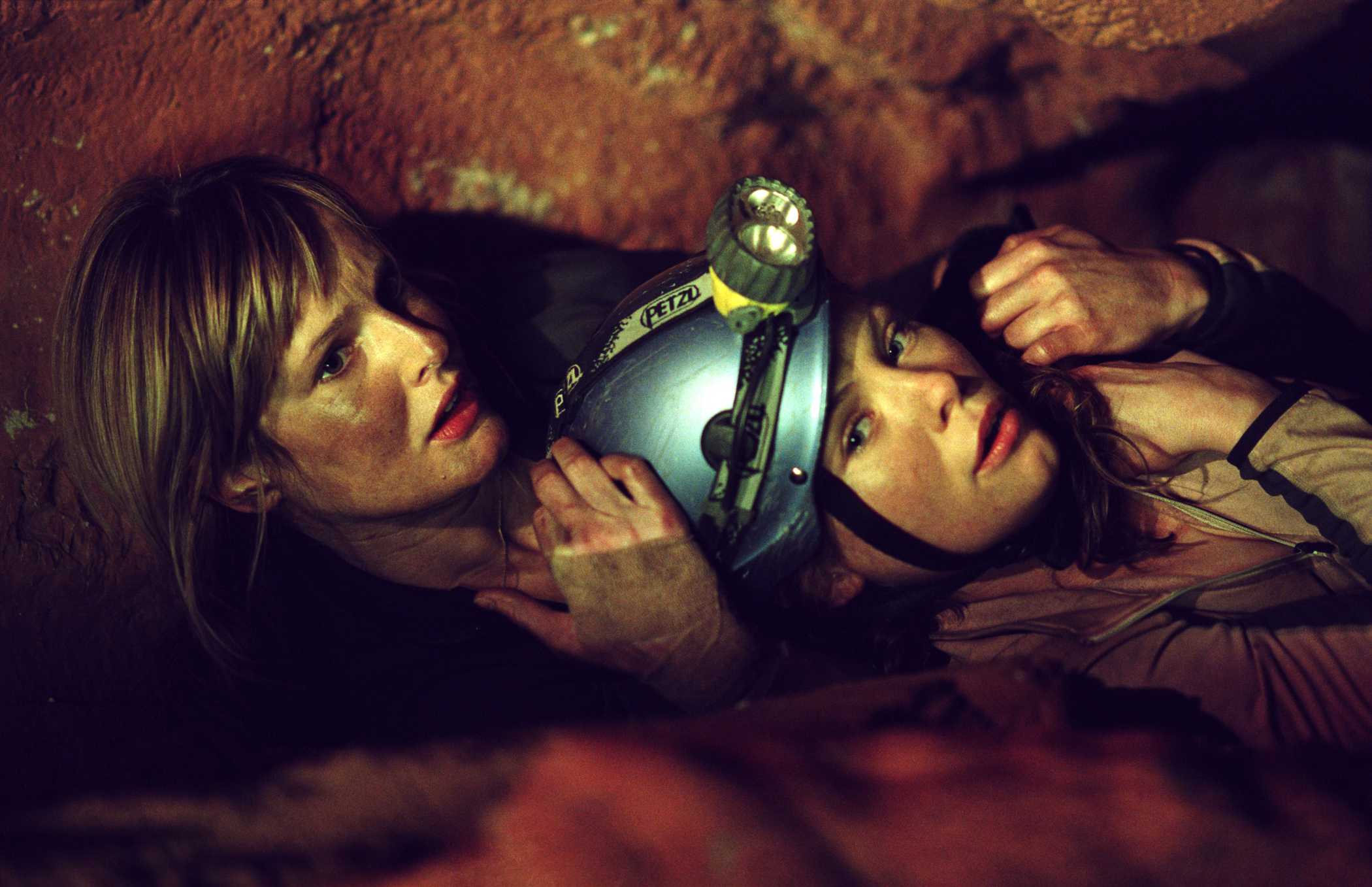
Like District 9, Neil Marshall’s satisfying B-grade horror flick The Descent has the good sense to grift from a lot of great movies. The mote-in-God’s-eye opening through the mountains is basically lifted directly from The Shining, and there’s more than a little Ripley and Vasquez to Shauna Macdonald and Natalie Jackson Mendoza’s characters respectively.
Nonetheless, Marshall’s film about an all-female spelunking trip gone horribly wrong eventually works on its own terms. Ok, the subterranean homesick rednecks are never particularly scary, and one of the endings works better than the other. But if you’re in any way claustrophobic, some of the underground business in the caves will definitely set your teeth on edge.
I never saw 2002’s Dog Soldiers or 2008’s Doomsday, but have heard they’re not as good. (There’s also a straight-to-video sequel to this movie, which I presume is terrible.) Still, for most of its run, The Descent operates at about the level of a quality, old-school John Carpenter movie like Prince of Darkness, The Thing, or They Live! It’s a hard groove to pull off decently, but with this film, Marshall nailed it.
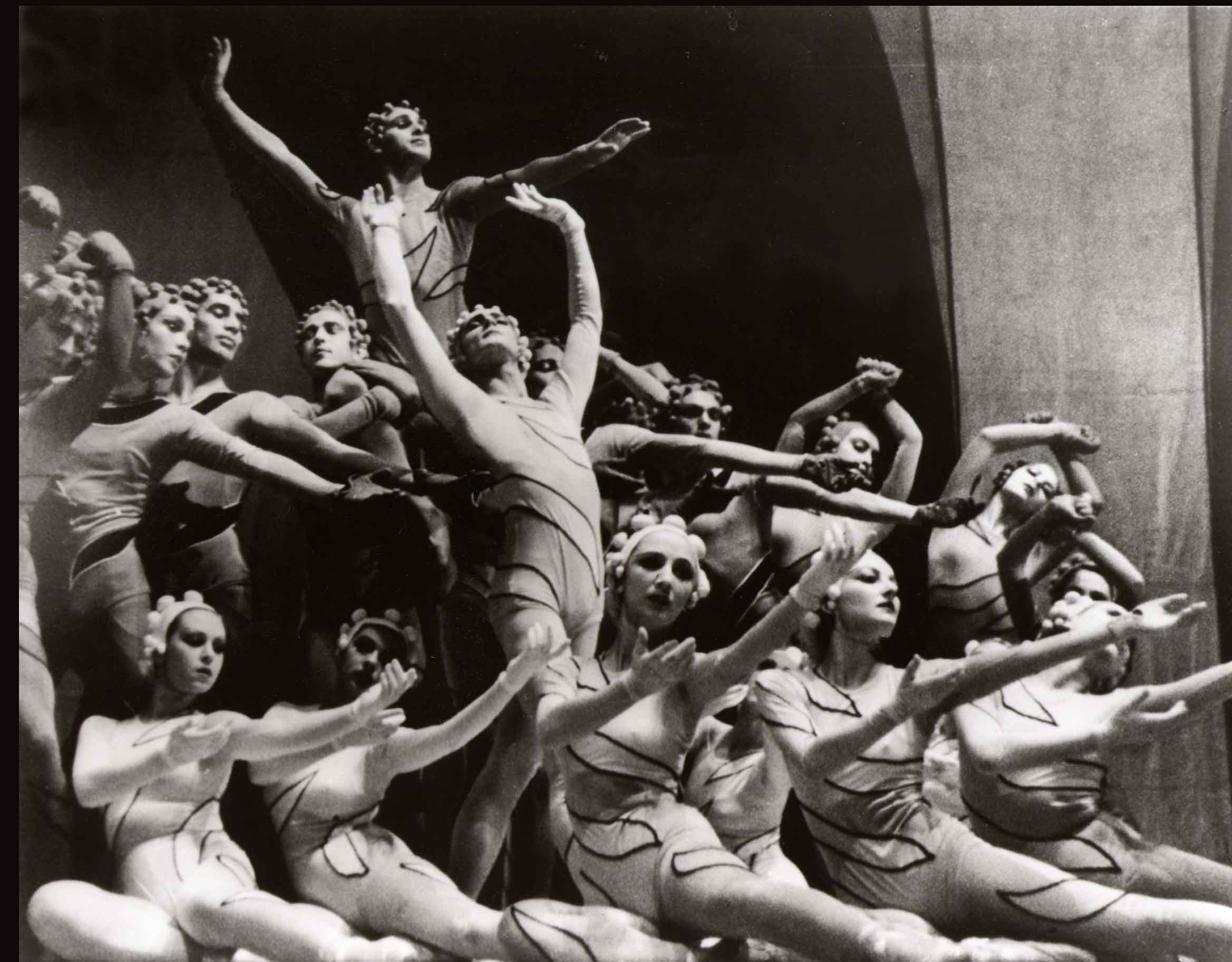
| From the original review: “It’s a stunning film, one that I’d even recommend to people who have little-to-no interest in ballet. Like the best documentaries — and this is the best I’ve seen in some time — Ballets Russes transcends its immediate topic to capture larger and more ephemeral truths…Like a perfectly executed ensemble piece, Ballets Russes can take your breath away.“
From the year-end list: “Penguins and comedians, to the wings — The lively survivors of the Ballets Russes are now on center stage. Like the best in dance itself, this captivating, transporting documentary was at once of the moment and timeless.“ |
Documentaries are almost assuredly under-appreciated on this list, mainly because I tend to miss a lot of the very well-reviewed ones, like No End in Sight and Taxi to the Dark Side. Dayna Goldfine and Dan Geller’s Ballets Russes I did see, tho’, and it’s a definite keeper. As much about both the inexorable passage of time and the eternal joys of dance (note the Russian octogenarians reliving their old duets) as the story of how ballet became a widespread pastime in America, Ballets Russes feels like it manages to capture something elusive about the human condition during the course of its run. True, I have more of a connection to the ballet world than a lot of moviegoers, but I still think this film will strike a chord with almost anyone with an open mind and a tendency to tap their feet.
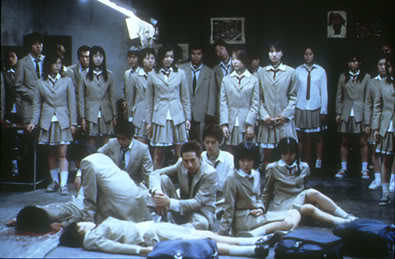

There can be only one. Those of you similarly disappointed with how Quentin Tarantino mishandled Go-Go-Yubari (a.k.a. a “homicidal Japanese schoolgirl with a tricked-up mace“) in Kill Bill, Vol. I need only go back to the source: Battle Royale. If you’ve never heard of it, this 2000 film by Kinji Fukasaku involves dozens of schoolchildren forced into a death match by an evil government program and a ticked-off teacher, the villainous (and iconic) Takeshi “Beat” Kitano.
Ok, yes, the film may be in questionable taste here in the post-Columbine era, and it’s spawned much concern about copycat behavior in Japan. (For those outraged by this film, I recommend Gus Van Sant’s Elephant as a tonic.) Take it for what it is, tho’, and Battle Royale is pretty solid entertainment, vaguely similar in a way to The Great Escape in wondering which characters are going to make it through the maelstrom. (The answer: Not many.)
Now, what does the Hong Kong “deep undercover” cops-and-robbers flick Infernal Affairs have to do with Battle Royale? Well, not much at all really, other than both being examples of quality Asian cinema (albeit from different nations.) But it occurred to me over the course of writing this second installment of the list that I’d forgotten about Infernal Affairs — I originally thought it came out in the 90’s — and so I had to slot it in somewhere. (This isn’t unprecedented. As you’ll see, there are a couple of times in the final 50 where films share the same slot.)
In any event, Infernal Affairs in, in my opinion, a superior film to its much-vaunted 2006 American remake, The Departed. To put it crudely but effectively, Infernal Affairs is old-school Jack Nicholson. It’s sharp and fast and lean and lethal. The Departed, on the other hand, was modern “Jack.” It was bloated and hammy and self-mocking and probably should’ve been reined in a tad. IA also had the benefit of getting there first, of course. And, if nothing else, Infernal Affairs has one of the coolest men in the world in its favor in Tony Leung (in the eventual di Caprio role), which is no small thing.

| From the original review: “[A] somber and engaging character study of the cops, journalists, and suspects caught up in the hunt for San Francisco’s most famous murderer, and a moody meditation on how, as months yield to years without a definitive answer, the long, tiring search for truth comes to haunt and drain their lives away…The film is kind enough to give the audience something of a sense of closure at the end, but Zodiac is most intriguing when it leaves all doors open, and lets its characters get thrown about in the bruising wind that ensues.“
From the year-end list: “The best film of the spring. What at first looked to be another stylish David Fincher serial killer flick is instead a moody and haunting police procedural about the search for a seemingly unknowable truth…Reveling in the daily investigatory minutiae that also comprise much of The Wire and Law and Order, and arguably boasting the best ensemble cast of the year, Zodiac is a troubling and open-ended inquiry…Whatever Dirty Harry may suggest to the contrary, the Zodiac remains elusive.“ |
(For what it’s worth, this film and the next one were flicks I traded back-and-forth for awhile, and both moved in and out of the top fifty.) A movie that makes for a good double-feature with one of the forgotten gems of 1999, Spike Lee’s Summer of Sam, David Fincher’s Zodiac works best when it foregoes the Se7en-like machinations of the actual San Francisco murders and concentrates on the Grail-like quest for certainty in an uncertain world.
Over the course of a draining decade of looking for “The Truth,” Jake Gyllenhaal, Robert Downey Jr., Mark Ruffalo, and the other cops and journalists on the trail all go slightly mad. The archives become a maze, the police records a bewildering thicket of potential clues and possible leads. In the real world, Zodiac suggests, Dirty Harry doesn’t solve the case, and Sam Waterston and Jerry Orbach don’t get to the bottom of it all in 48 minutes + commercials. In the real world, you never know…you just never know.

| From the original review: “One of the things I admired most about this very dark film is its sheer remorselessness. From its opening moments and throughout, it instills a visceral fight-or-flight dread in the audience and refuses to let us off the hook, inviting us less to tsk-tsk about the hubris of American military overreaching and more to ponder what measures — moral, immoral, amoral — we might take to ensure our own survival in this nightmarish universe. Time and time again in 28 Weeks Later, compassion is absolutely the wrong answer to the problem at hand, and…people surprise you with the decisions they choose to make with their backs to the wall.“
From the year-end list: “Sir, we appear to have lost control of the Green Zone…Shall I send in the air support? Zombie flicks have been a choice staple for political allegory since the early days of Romero, but one of the strengths of Juan Carlos Fresnadillo’s merciless 28 Weeks Later — perhaps the best horror sequel since James Cameron’s Aliens — is that it foregoes the 1:1 sermonizing about failed reconstructions and American hubris whenever it gets in the way of the nightmare scenario at hand…There’s little time for moralizing in the dark, wretched heart of 28 Weeks Later: In fact, the right thing to do is often suicide, or worse. You pretty much have only one viable option: run like hell.”“ |
A considerable improvement over the uneven first installment by Danny Boyle and Alexa Garland, Juan Carlos Fresnadillo’s 28 Weeks Later is an absolutely ruthless film. Beginning with Robert Carlyle’s Hobson’s choice in the English countryside (Well, what would you do? Really? Are you sure?), Fresnadillo’s film thrusts you into several ghastly and viscerally immediate situations where morality isn’t much of a guide. Is General String (Idris Elba) right to order the immediate death of Alice the found survivor (Catherine McCormack)? Should Sniper Jeremy Renner be shooting civilians or not? Should doctor Rose Byrne really be helping these two children, also potential carriers of the virus?
There are no easy solutions in 28 Weeks Later — That’s part of what makes it so horrible (and the film so good). As with District 9, Fresnadillo doesn’t let the political parable (here, the American reconstruction of Iraq) interfere with the story he wants to tell. And that story is very dark indeed.
Halfway there, folks. Part III to follow sometime on the other side of Santa…In fact, it’s here!
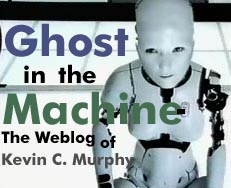
And, after two-to-three years of building out a website on Geocities, mostly consisting of rinky-dink book reviews, I decided one day to embark on an experiment. I had tried several times over my first twenty-five years to keep a journal, and had given up each time. The product mostly came out as navel-gazing, self-indulgent whining, and, frankly, it bored me to write it. But, I realized after discovering sites like Megnut, Saturn, and Barbelith one day, what if I wrote that journal on the Internet? A public forum would help rein in the Gaelic melancholy, it would focus my thinking on the issues I cared about, and it would structure the many hours I spent dinking around online already…
Ten years ago today, Ghost in the Machine was born. [0, 1, 2, 3, 4, 5, 6, 7, 8, 9.] (FWIW, I chose the name for a lot of reasons, none of them really having to do with Arthur Koestler or the Police — It was a callback to one of my triumvirate of favorite movies (along with Amadeus and Miller’s Crossing): Terry Gilliam’s Brazil. (“Ere I am, J.H…“) It was already the name of my coxing column for Rowersworld, because it describes almost perfectly what a good coxswain is. And, given that I was working as a DC ghostwriter at the time, it seemed appropriate in that way too.)
At any rate, the very first post included a movie review (Being John Malkovich — I liked it!) and some primary 2000 coverage (as old-school visitors may remember, I was very, very pro-Bradley and anti-Gore that year), and those are the twin axes GitM has mostly revolved around ever since. (You could argue the spinoff content ’round here has done better, tho’ — The Leaky Cauldron ended up becoming one of the premiere Harry Potter sites on the web (no thanks to me), and, on any given day, the part of this site that gets by far the most hits are my American History orals summaries, mostly undergrads looking for Cliff Notes, I presume.)
And so, ten years passed. There was 2000 and 2004 and 2008. There was 9/11 and Afghanistan and Iraq. There was orals and the interminable, continuing dissertation. There was Spin This and Bush Must Go and HTRSC and Trainwreck (and soon, Toxic Talk.) There was Casino Jack and Boss DeLay. There was Geocities and Movable Type. There was DC and New York and then DC again. There was New Zealand and Hawaii (often). There was Vegas and the West Coast, the DR and Denver. There was Elaine and Jen and Amanda. As of May 2000, there was and is my trusty sheltie sidekick, l’il Berkeley. There was a lot of thinking about progressivism. And there were movies…lots and lots of movies. If they keep making ’em, I’ll keep watching ’em.
Now, a decade later, I am back where I began — in DC, working as a speechwriter. And that’s fine…more than fine, actually. At least for now, I feel like this is where I belong. As for the blog, well, after ten years of doing this, I don’t ever expect GitM to be well-read anymore — the stats peaked six or seven years ago, and, quite frankly and by all indications, this now seems like a reasonably dead corner of the web. Nonetheless, I expect GitM will continue.
So, here’s to the first ten years, and fate-willing, here’s to many more. And if you’ve been coming by here for a day, a month, a year, or a decade, thanks, as always, for dropping by. It is much appreciated.
